deggendorf institute of technology
pioneering and vibrant
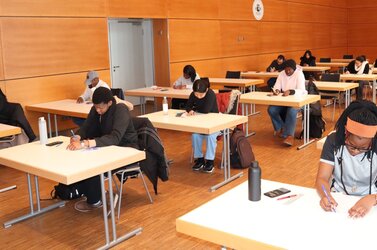
Months of intensive preparation are behind them. Now it's time for exams at the European Campus Rottal-Inn (ECRI) of the Deggendorf Institute of Technology (DIT/THD). All 1,575 students are required to demonstrate their knowledge in a total of 235 exams in nine degree programs in accordance with their curricula. The exam period lasts three weeks until February 13.
“Please be quiet. Examination”
The exam period is in full swing. Signs in front of the lecture halls urge people to be quiet so as not to disturb the students. Behind the closed campus doors and in the city hall (Stadthalle), the examinees from five bachelor's and four master's degree programs are poring over the tasks set for them. They are being tested on their specialist knowledge in the overarching ECRI areas of tourism, health/digitalization, energy/technology, and sustainability/construction. Dean Prof. Christian Steckenbauer is keeping his fingers crossed for all graduates, but also says: “Our curricula are strict, the examinees are not being given anything for free.”
Since students take more than one exam, the ECRI study center has received up to ten registrations per capita in some cases. With 78 registrations, the bachelor's degree program in Industrial Engineering accounts for the largest single examination in “Principles in Business & Economics”.
Exams also in the city hall
The exams are not only held in the campus lecture halls. For space reasons, a number of exams are moved to the spacious city hall. This means that the tests do not have to be spread across several rooms. The following applies to all exams: The use of electronic devices such as cell phones is not permitted during the exam. For the first time, checks will be carried out to ensure that no artificial intelligence (AI) is used.
As always, the focus is on written exams. However, oral exams and the timely submission of research papers are also part of the requirements. “The exam requirements are strict,” confirms Birgit Espertshuber, head of department at the ECRI Study Center. According to her, repeated failure to meet deadlines will result in de-registration.
Grades announced in March
Mandatory retakes have already taken place, as have the compulsory language exams. Students and lecturers alike hope for the best possible results in all exams. The results will be announced starting March 2. For students in advanced semesters, bachelor's and master's theses are on the agenda in addition to exams.
The European Campus Rottal-Inn in Pfarrkirchen has been the international study location of the Deggendorf Institute of Technology for eleven years. Currently, students come from around 100 countries in Europe, Asia, Africa, and America. “In addition to technical training, there is a special focus on teaching German language skills,” says Prof. Dr. Steckenbauer.
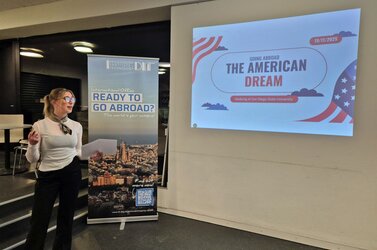
From November 10th to 20th, the International Office of Deggendorf Institute of Technology (DIT) transformed the campus into a gateway to the world. The Go Global Weeks offered students not only information, but also inspiration and the courage to take the step abroad. A variety of events provided opportunities to learn about exchange programs, internships, and countries, and to alleviate fears through personal experience reports.
Academic Advantage and New Opportunities
The series was opened with "Ready for Abroad?", an event that gave an overview of the possibilities and advantages of a stay abroad. International experience is not only an academic advantage but also promotes independence and opens up new opportunities, including an international career start. For this purpose, the event "Five Steps to an International Internship" was held, which explained how to successfully start an internship abroad.
Focus on Europe with Erasmus+
A highlight of the first week was the Erasmus+ Day, which focused on the European area within the framework of the Erasmus+ program. An information session on financing, funding opportunities, and application processes was followed by a Meet & Greet with students who reported on their semesters abroad in Spain, Finland, Hungary, and even Aruba.
Global Perspectives and Intercultural Training
The second week broadened the view for global perspectives. The South Korea Workshop was particularly impressive, designed by two Korean exchange students who introduced their homeland, language, and university. This direct exchange conveyed a vivid picture of life in South Korea. This was complemented by an Intercultural Training that sensitized students to cultural differences and prepared them for international situations.
Special Guest from Australia and Experience Reports
The highlight of the second week was the "Go Global" Day. In addition to information on worldwide study options and funding opportunities, the University of the Sunshine Coast from Australia presented itself as a special guest. This day was also rounded off with experience reports from former exchange students about countries like Brazil, Canada, South Korea, and Hawaii.
Emotional and Interpersonal Dimension
The Go Global Weeks 2025 were thus far more than just information events. They conveyed not only facts but also the emotional and interpersonal dimension of a stay abroad. Overall, it was a successful impetus to overcome borders and broaden one's own horizons, both geographically and mentally.
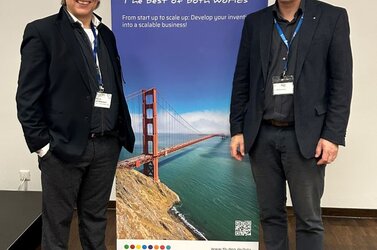
As part of the BITZ OPEN series of events, the Bavarian Innovation and Transformation Centre (BITZ) at the Deggendorf Institute of Technology (DIT) in Oberschneiding welcomed Dr. Michael Richter from Fraunhofer IGB – Straubing site as keynote speaker on 13 November. His lecture on ‘Bio-inspired Chemistry’ attracted a large and very interested audience and also marked the start of a potential, promising collaboration between the Lower Bavarian institutions.
Dr. Richter presented the innovative approach of bio-inspired chemistry, which promises a fundamental shift towards more sustainable products. This approach differs fundamentally from the synthesis of fossil-based products. At its core, it involves searching for exclusive molecules in nature and integrating them functionally into chemicals and materials as bio-based building blocks in order to create products with a significant functional advantage.
In his presentation, Dr. Richter discussed the development of innovative polyamides from natural terpenes (the main components of essential oils). He also presented novel approaches to the use of proteins for sustainable adhesive systems, using chicken feathers as an example. In the publication ‘An environmentally friendly process for the specific decomposition of chicken feather keratin into polythiol building blocks’, Dr. Richter's research group describes the ‘green’ methodology behind this process.
Finally, the potential of bioelectrocatalysis and its contribution to alternative concepts of electricity-driven enzymatic fine chemical synthesis was discussed.
The event made it clear that there are considerable overlaps and synergies between the neighbouring Lower Bavarian institutions. ‘Both institutions bring solution and acceleration expertise as well as an agile start-up mindset to the table,’ emphasise the hosts. This combined strength opens up the potential to become even more powerful – especially in diverse collaborations with regional companies. The aim is to deepen this cooperation in the near future.
The lively interest in the event confirmed the relevance of the topic: in view of the current challenges in Europe, green chemistry and sustainability are key factors that must also be considered in the context of resilience, sovereignty and security.
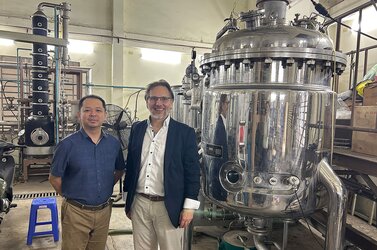
The Deggendorf Institute of Technology (DIT) is strengthening its international partnerships and continuously expanding them. To this end, a delegation consisting of Professor Jeff Wilkesmann from the Transformation Lab at the Oberschneiding Campus and Professor Andreas Gissel and Eva Nefen from the Rhine-Neckar Graduate School travelled to Ho Chi Minh City in Vietnam from 3 to 7 November. The trip took place as part of the project “Innovative Biocatalytic Pathways for Sustainable Bioengineering: Strengthening Vietnam–Germany Research Synergies.” The aim was to deepen research and academic cooperation, promote intercultural exchange, and gain direct insights into one of the most dynamic economic regions in Southeast Asia.
Exchange with partner universities
During their trip, the delegation visited the University of Transport Ho Chi Minh City (UTH), Ho Chi Minh City University of Technology and Education, and International University – VNU HCMC. As part of the academic exchange, DIT Professor Jeff Wilkesmann, Scientific Director of the Transformation Lab, gave a lecture on ‘Innovative Biomaterials on the German Market: A Risk Management Approach for Start-ups and SMEs’. Joint workshops and presentations by Vietnamese students facilitated productive dialogue and mutual insight into international business and research practices.
Insights into industrial processes
In addition to academic institutions, the delegation also visited important industrial partners. Clevermann EU and Siemens Energy provided valuable insights into industrial processes in Vietnam. The delegation also visited the German House in Ho Chi Minh City, headquarters of the German Chamber of Commerce in Vietnam (AHK Vietnam). There, further information was provided on Vietnam's dynamic economic development and on the activities marking the 50th anniversary of diplomatic relations between Germany and Vietnam. Cultural activities rounded off the programme and provided additional opportunities for exchange and reflection.
Strong and sustainable research partnership
Prof. Wilkesmann was welcomed by Prof. Nguyen Dinh Quan at Vietnam National University Ho Chi Minh City, who was the main host during the trip. ‘The support and constructive cooperation with Prof. Nguyen Dinh Quan is a real asset. We are convinced that this joint project marks the beginning of a strong and sustainable research partnership and paves the way for feasibility studies and future initiatives to develop innovative biocatalytic processes in the field of sustainable bioengineering,’ said Prof. Wilkesmann.
About the project
The aim of the project is to establish a long-term, effective research partnership between DIT Transformation Lab and Vietnam National University Ho Chi Minh City. Prof. Quan is internationally recognised for his contributions to biomaterials, metabolic engineering and the development of scalable bioprocesses in various environmental contexts. Prof. Quan was honoured for his work on converting paper waste sludge into bacterial cellulose (BC) through acid hydrolysis and subsequent fermentation. BC is known for its biodegradability, mechanical strength, biocompatibility and non-toxicity. BC has a wide range of applications in biomedicine, water treatment, packaging and fashion. The further potential of BC was demonstrated after partial hydrolysis for the production of cellulose nanocrystals (a high-performance biomaterial with properties that are stronger than steel, lighter than wood, transparent and environmentally friendly). This is in line with the research topics of the DIT Transformation Lab. The significance of this collaboration goes beyond pure research progress in the field of bioengineering. It is in line with the overarching science policy goals of Germany, Vietnam, ASEAN and the EU. It supports the UN Sustainable Development Goals, promotes technology transfer and strengthens global research networks.

From 20 to 25 October, a delegation from the Deggendorf Institute of Technology (DIT), consisting of Prof. Dr. Jeff Wilkesmann and Dr. Richard Janissen, visited Santa Clara University (SCU) and Stanford University in the USA. The purpose of the visit was to promote international cooperation within the context of a scientific project.
Development of novel biocatalysts
DIT researchers are collaborating with Professor Prashanth Asuri (Santa Clara University, SCU) to develop novel biocatalysts that will facilitate the degradation of cellulose-rich agricultural biowaste. During their visit to SCU and Stanford University, the participants exchanged ideas on the project 'Next-generation enzymes and bio-scaffolds for promoting the biodegradation of cellulose waste', which is funded by the Bavarian-California University Centre. The project's main objective is to produce highly active, industrially robust enzymes suitable for large-scale industrial use.
Future joint research projects and educational initiatives
The stay in the USA also laid an excellent foundation for future joint research projects and educational initiatives in bioengineering. Furthermore, collaboration and innovation between DIT and SCU were strengthened. In March 2026, Prof. Prashanth Asuri will travel to Lower Bavaria and give a guest lecture at the Transformation Lab on the Oberschneiding campus, which will also be open to the general public.
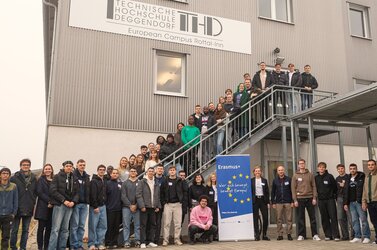
For ten days, the International Office at the European Campus Rottal-Inn (ECRI) of the Deggendorf Institute of Technology (THD) held an Erasmus+ Blended Intensive Program (BIP) entitled “AI for Health,” a short-term study program with partner universities on the topic of artificial intelligence (AI) in healthcare. The event seamlessly transitioned into three days of the “DigiHealthDayS” conference, part of the global forum for health. At the conclusion in the Pfarrkirchen town hall, Bavarian Health Minister Judith Gerlach joined the event.
When it comes to research into digital medicine, the district town of Rottal proved itself to be the hub of the European research world for a total of twelve days, with English-language lectures, workshops, and discussions. The BIP brought together nine scientists and almost 60 students from 13 partner universities, including the European Campus. The subsequent “DigiHealthDayS” featured 40 internationally renowned speakers and around 400 participants from well over 100 countries, both on site and online.
BIP with partner universities
First, the “Erasmus+ Blended Intensive Programme” discussed the possibilities of artificial intelligence for healthcare – from research and development to clinical testing and safe implementation. The discussion focused on how modern technologies learn independently from data, recognize complex patterns, and support clinical decisions, for example in medical diagnostics. In terms of data quality, the focus was on how AI tools work transparently, reliably, and impartially. In this context, participants dealt with algorithmic recommendations as well as ethical issues such as patient privacy. Ultimately, it is important to ensure that digital solutions are accepted by medical professionals and patients. The following universities, among others, participated as partners in the ECRI: Luleå University of Technology (Sweden), Thomas More University (Belgium), and the University of Agder (Norway).
DigiHealthDayS with link to the ministry
The sixth edition of DigiHealthDayS kicked off with the annual meeting of XiA members and their project on cooperation in healthcare. On the following day of the congress, Prof. Dr. Horst Kunhardt welcomed participants to a “global view of digital health from the heart of Europe.” Appearing as an avatar, DHDs initiator Prof. Dr. Georgi Chaltikyan called “artificial intelligence an accelerator of the digital world.”
In her video message, Bavarian State Minister for Health, Care, and Prevention Judith Gerlach described “digitalization as an integral part of our lives, especially in times of skilled labor shortages.” Deputy Mayor Hans Hirl praised “the European Campus's great commitment to digital health” on behalf of the city. THD Vice President Prof. Dr. Marcus Herntrei was pleased “that the meeting serves as a bridge between science and society.” From a clinical perspective, Chief Physician Dr. Jürgen Terhaag (Rottal-Inn Clinics) made it clear: “It is challenging to introduce technologies that quickly become obsolete.” In his opinion, the shortage of skilled workers, especially in rural areas, is driving the upcoming developments.
On the research side, Bart de Witte (founder of Isaree), for example, discussed the future of AI-based automated assistance platforms, such as for taking medication. Prof. Rajendra Pratap Gupta (UN/WHO, among others) saw digitalization as “heralding a golden age of medicine.” Isabelle Zablit-Schmitz (Deputy Director General of Numeum) initially favors “European solutions.” In addition, Dr. Karapat Davtyan from the World Health Organization reaffirmed in his message “the collaboration with Prof. Chaltikyan's team at the European Campus as a WHO Collaborating Center.”
From the organizational side of the coordinating university, Daniela Schwertlinger and Marion Bachmeier-Staab (International Office) reported a “positive response to the BIP.” Their supporting program included a “welcome dinner” and an excursion to Munich. How the impetus given will lead to progress in research will be discussed at the next meeting. In keeping with this, the global forum called “DigiHealthDay” (DHD) will remain active throughout the year, supported by Minister Gerlach as patron. The IT specialist MDSYSTEC GmbH (Mitterskirchen) acted as the main sponsor of DHDS.
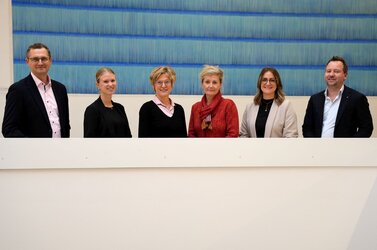
Studying doesn't always go perfectly, and sometimes you have to start looking for alternatives. To address this issue, the Deggendorf Institute of Technology (DIT) has now launched the project ‘ReStart EDU2WORK | Turning study challenges into career opportunities’ in collaboration with the Federal Employment Agency, the Immigration Office and the Regional Management Department of the Deggendorf District Office.
Giving international students who have dropped out of university new perspectives
The project focuses on students who are about to drop out of university, or more specifically, international students who are struggling with their studies at DIT or are even considering dropping out. In this case, the network of DIT, the Federal Employment Agency, the Immigration Office and Regional Management offers them comprehensive advice on opportunities in the region. The possibilities here are manifold. In addition to starting as a skilled worker or changing courses, dual studies or vocational training offer excellent opportunities to enter the regional labour market directly. The aim of the ReStart EDU2WORK project is to increase the integration of international students into the labour market. This gives young people an excellent alternative to studying, and the local economy benefits from motivated skilled workers, which in turn benefits the educational region of Lower Bavaria.
Reaching your goal through advice and networking
In future, regular consultation appointments will be offered at the THD as part of the project. Through cooperation with the Federal Employment Agency, the Immigration Office and the Regional Management of the Deggendorf District Office, students will be shown the best possible opportunities and presented with the various alternatives in detail and comprehensively.
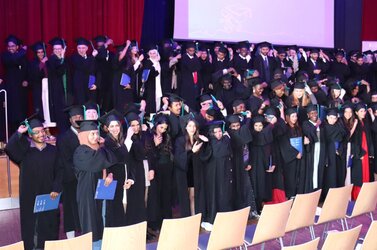
Another cohort of 234 successful graduates from nine degree programs is leaving the European Campus Rottal-Inn (ECRI) at the Deggendorf Institute of Technology (DIT). That is 32 more than last year. At the graduation ceremony in the town hall in Pfarrkirchen, 75 master's and 30 bachelor's degree holders were personally bid farewell. A number of former graduates were invited for the first time.
In accordance with international customs, the new graduates appeared dressed in black gowns and hats. Just under half of them were able to attend in person to receive their certificates. The rest were able to follow the ceremony via livestream. After all, the graduates are among the 1,500 ECRI students from around 100 countries who, after graduation, settle in many different regions. The graduates are now available to the job market as skilled workers.
Thoughts on farewell
The event was held partly in German and partly in English. Dean Prof. Dr. Christian Steckenbauer thoughtfully described graduation as “also an entry into a world that is changing rapidly.” He said it was important to work together to defend the foundations of a free society. THD Vice President Prof. Dr. Martina Heigl-Murauer viewed “education as a shared journey into a promising future” and called on everyone to “be the change you want to see in the world.” In her graduation speech, Magistra Sana Rauf from Pakistan encouraged lifelong learning and stated: “The best ideas often arise in conversations with people who see things differently.”
In his congratulations to the graduates, Deputy District Administrator Kurt Vallée praised “the boundless exchange and diversity at ECRI.” Mayor Wolfgang Beißmann confirmed: “The European Campus demonstrates coexistence in the world.” Both encouraged the graduates to take up employment in the region. University chaplain Felix M. Schandl called on to “respect creation.”
Presentation of certificates
One by one, the professors responsible for the individual degree programs addressed the graduates present to present them with their diplomas. Prof. Dr. Sabine Dittrich encouraged “global cooperation.” On behalf of Prof. Dr. Georgi Chaltikyan, she and the dean presented the certificates to 32 Master's students in Digital Health and two Master's students in Medical Informatics, as well as twelve Master's students in Global Public Health.
Prof. Dr. Michael Laar called on the 17 Master's students in Healthy and Sustainable Buildings to “strive for scientific truth.” He also advised them: “What counts today may be obsolete tomorrow.” THD Vice President Prof. Dr. Marcus Herntrei appealed to the twelve newly minted Master's in International Tourism Development and five Bachelor's in International Tourism Management graduates to “use the knowledge they have acquired to shape the future of tourism in a sustainable way.”
Prof. Dr. Stefan Mátéfi-Tempfli wished his three Bachelor's in Energy Systems Engineering graduates “fond memories of this milestone.” Representing Prof. Dr. Thomas Spittler, Prof. Dr. Christian Rummel welcomed seven Bachelor of Health Informatics graduates “to this important field of the future.” Prof. Dr. Raimund Brotsack called on his 15 successful Bachelor of Industrial Engineering graduates to “be translators between engineering and the business world.”
Two rituals symbolized the graduates' admission into the academic community: moving the faculty's turquoise hat tassel from the right to the left side and the jubilant throwing of the hat into the air. The graduates were only too happy to do so.
Alumni meeting
On the occasion of the tenth anniversary of ECRI's founding, former graduates were invited to the graduation ceremony for the first time as “pioneers of the ECRI vision,” according to Prof. Dr. Steckenbauer. Head of Staff Ulrike Sauckel led a short discussion with five of the 24 alumni present about their campus memories. In this context, Severin Eder said, referring to Frank Sinatra's song: “If you can make it in Pfarrkirchen, you can make it anywhere.”
The Gerl-Ochsenbauer duo provided musical accompaniment for the event, concluding with the European anthem. Guests of honor included university coordinator Georg Riedl and representatives from education, business, and politics. The event was organized by the THD alumni team in collaboration with the European Campus. Organizer Stefanie Ruckpaul concluded by encouraging “unity in diversity.”
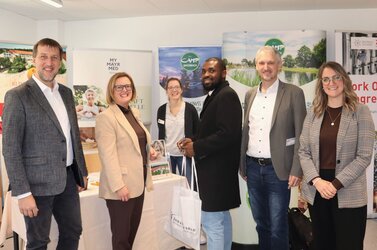
The sixth Job Fair at the European Campus Rottal-Inn (ECRI) of the Deggendorf Institute of Technology (DIT) has once again proven to be a lucrative event. For five hours, more than 200 students eagerly took advantage of the opportunity to establish valuable contacts with 14 regional companies from various industries. Two companies participated exclusively online for the first time.
Dean Prof. Christian Steckenbauer described the job fair as “one of the annual highlights on campus.” He is convinced that this event brings together the skilled workers trained at the university and regional and national companies in a targeted manner. He called on the students to “take advantage of the opportunity to make contacts.” During a tour, Mayor Wolfgang Beißmann encouraged students to “discover the diverse opportunities that the region has to offer.”
Supply and demand
The companies present represented a wide range of industries, from technology and construction to tourism and healthcare. Half of the companies took the opportunity to present themselves in a round of introductions. All of them promoted themselves at exhibition stands covering the entire ground floor of the laboratory building. There was a constant coming and going.
From internships to permanent positions: there was great interest on both the supply and demand sides. There was also an exchange of ideas on how students can write their theses in collaboration with companies. Design engineer Moritz Kreck from stela Laxhuber summed it up as follows: “Some of the conversations were very promising, now we're waiting for the applications.”
They were there
The job fair takes place every year in fall. It is organized by the DIT`s Career Service, which knows only too well that small conversations can lead to big careers. The following companies were there: ABC Vermögensverwaltung/Vital CAMP Bayerbach, Ed. Züblin, Ensana, EURES - Beratung der Agentur für Arbeit, Haas Fertigbau, IGK Ingenieurgesellschaft Klein, Johannesbad Reha Kliniken and Johannesbad Hotels, Lindner Group, Rehabilitationszentrum Klinik Rosenhof, Schlagmann Poroton, stela Laxhuber, and Techniker Krankenkasse. Also making their debut as digital participants (“Virtual Company Pitch”) were: OnlineBuchungService and Frauscher Sensortechnik.
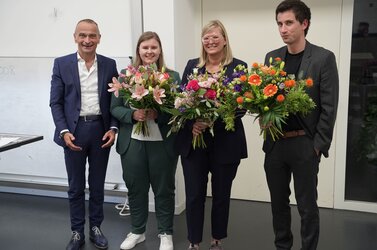
The annual general meeting of the Deggendorf Friends and Associates Association, held on 23 September at the Deggendorf Institute of Technology (DIT) university campus, was characterised by a sense of harmony and satisfaction amongst attendees. The actions of the executive committee for its work in 2024 were approved by the general meeting in accordance with the statutes, and the committee was re-elected directly for a further term of three years. Consequently, Johann Kraus, the former head of the Rohde & Schwarz plant in Teisnach, has been appointed as the inaugural chairman. In addition, Treasurer Stefan Swihota and the four deputy chairmen, namely Dr. Christian Moser, Alexander Kaiß, Prof. Dr. Andreas Buske and Dipl.-Ing. Peter Radlsbeck, were also confirmed in office. Professor Waldemar Berg, the incumbent president of the university, represents the fifth member of the group of deputies by virtue of his office.
A particularly noteworthy aspect of the evening's proceedings was the revelation that, despite the challenges posed by the Corona and post-Corona years, the membership of the Deggendorf Friends and Associates Association never dipped below the crucial threshold of 500 individuals. Following a period of substantial growth, the Association has now once again surpassed that figure. The Chairman, Mr Kraus, emphasised the pivotal role of the Friends Association's members and their contributions in ensuring the success and efficacy of the organisation's endeavours within the university. In his financial report, Treasurer Swihota had previously highlighted the volatility of income from donations, contrasting this with the reliability of membership fees as a consistent source of financial support for the organisation's operations. In light of this, Kraus made an appeal to all members present, urging them to actively recruit new members from their respective networks of friends and colleagues. It was asserted that the university constitutes a significant economic catalyst within the region, meriting the active support of all stakeholders.
The President of DIT, Mr. Berg, delivered a rapid annual overview to his guests from the Deggendorf Friends and Associates Association. The presentation was rich in success stories, both large and small. The general meeting concluded with three insights into the prevailing academic environment at the university. Professor Sabine Wiesend of the Faculty of Electrical Engineering and Media Technology delivered a report on 'Flight into Shadow', a student lighting technology project that was exhibited this year at the Architecture Biennale in Venice – one of the most significant events in the world of architecture. Professor Dr.-Ing. Niklas Urban not only provided a comprehensive insight into the intricacies of the automation and robotics laboratory, but also facilitated a discourse on the future of these fields. The presentation comprised a series of images intended to convey the current state of the field of robotics. In addition, the speaker reported that students enrolled in the Faculty of Applied Natural Sciences and Industrial Engineering are being trained in accordance with the latest developments in the field. Finally, Annika Schickle, a physician assistant student at the Faculty of Applied Healthcare Sciences, delivered a speech in which she articulated her personal experience of education at the university and reported on the opportunities available to students in her position. These range from participation in humanitarian missions in Uganda and attendance at international conferences to exchange programmes with prestigious Ivy League universities in the USA.
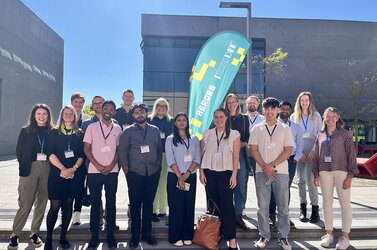
The possession of transformative power is of paramount importance. This approach facilitates not only adaptation, but also active rethinking – of solutions, systems and oneself. The Future Skills Alumni Conference, which was held from 18 to 20 September at the Deggendorf Institute of Technology (DIT), was dedicated to this area of expertise. Eighteen alumni from universities within the HEROES Alliance delivered presentations.
The event focused on the subjects of judgement and digital ethics, innovation and change competence, as well as meaning orientation and start-up competence. The alumni imparted their expertise and personal experiences with practical examples, including the role of civil engineering in the energy transition, cybersecurity in healthcare, and the comparison between humans and artificial intelligence.
The event focused on the subjects of judgement and digital ethics, innovation and change management, as well as purpose orientation and start-up skills. The alumni imparted their expertise and personal experiences with practical examples from their careers, including the role of civil engineering in the energy transition, cybersecurity in healthcare, and the comparison between humans and artificial intelligence.
All speakers successfully completed their studies at a university within the HEROES Alliance, a transnational coalition of higher education institutions with a commitment to enhancing the resilience of individuals, businesses and nature in the region. The THD, represented at the conference by 16 alumni, has been an official member of the newly founded alliance since 2025. The contributions of the alumni serve to enhance knowledge transfer within the international university network, thereby promoting the development of transformative skills that enable active participation in shaping the future.
The presentations were streamed live and subsequently recorded. These are now available for viewing on the internet at th-deg.de/alumni-konferenz.
About the Future Skills Alumni Conference
The conference was held as part of the "European University Networks (EUN) – National Initiative" programme. The programme is funded by the German Academic Exchange Service (DAAD) and the Federal Ministry of Education and Research.
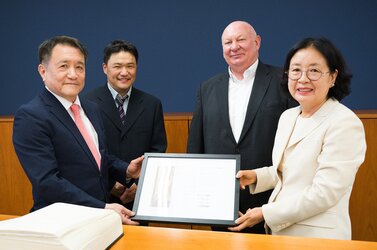
The strategic partnership between Deggendorf Institute of Technology (DIT), the WURI Foundation (World’s Universities with Real Impact), and the Institute for Nation Brand Promotion was officially launched on 26 June with the signing of a Memorandum of Understanding (MoU) at Deggendorf Institute of Technology. As part of this cooperation, DIT will host the prestigious WURI Global Conference in September 2026.
In addition to the ceremonial signing of the agreement, an initial planning meeting was held in Deggendorf to discuss key organisational and thematic aspects of the event. The MoU was signed by Prof. Waldemar Berg, President of Deggendorf Institute of Technology, together with South Korean representatives Prof. Dr. Dong-sung Cho, Founder of the WURI Foundation, Jeong-wan Cho, CEO of the WURI Foundation, and Prof. Dr. Jin-suk Kim, President of the Institute for Nation Brand Promotion.
The WURI Global Board selected Deggendorf Institute of Technology as host in recognition of its consistently high performance in the WURI Rankings. Following its top placements in recent years – ahead of renowned institutions such as Berkeley, Princeton and Chicago – this latest recognition highlights DIT’s standing as a globally active, innovation-driven university once again. Furthermore, the MoU reflects the strategic importance of transnational networks and DIT’s commitment to advancing global higher education.
The international academic forum is expected to attract around 300 representatives from universities and organisations across the globe to Deggendorf in September 2026. The South Korean partners will be in charge of attracting participants and developing the conference programme, while DIT, as the local event organiser, will oversee the on-site management. The conference aims to connect innovative universities worldwide and set new benchmarks for assessing their societal impact, innovative strength and entrepreneurial responsibility. In addition, the event seeks to enhance the visibility and reputation of all participating institutions in the long term.
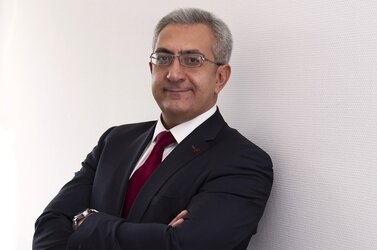
WHO/Europe has designated the European Campus Rottal-Inn (DIT-ECRI) at Deggendorf Institute of Technology in Germany as a collaborating centre on digital health. Collaborating centres carry out activities in support of various WHO programmes in areas such as medicine, public health, nursing and midwifery, and more.
DIT-ECRI will support WHO in strengthening digital health systems, including through policy and strategy development, training and capacity building, as well as research and evaluation of digital health interventions. The collaboration is expected to last 4 years with the possibility of extension.
“We are proud to be among 27 WHO partners in Germany and the only one in the field of digital health. We are committed to supporting WHO's vision of using digital technologies to transform health systems and reach underserved populations, as outlined in the WHO Fourteenth General Programme of Work (GPW14),” said Prof. Dr. Georgi Chaltikyan, head of the new center. Dean Prof. Dr. Christian Steckenbauer sees this as “a milestone in health research and in the internationalization of the European Campus”.
Specifically, DIT-ECRI’s contributions will include providing data and analyses on existing digital health policies and ethics frameworks, identifying potential gaps, and providing evidence-based recommendations for policy enhancements. DIT-ECRI will collaborate with WHO to revise and refine a comprehensive toolkit covering the planning, deployment, and evaluation of digital health solutions. To improve workforce competencies in digital health, DIT-ECRI will develop targeted training materials, coordinate capacity-building initiatives, and guide the upskilling of health care professionals. Under WHO’s coordination, DIT-ECRI will also engage in research and evaluation of digital health interventions to ensure a robust evidence base for continued innovation and improvement.
“Modernizing health care and making sure that digital tools are safe and accessible is a priority for us at WHO. Germany is a key player in advancing digital health in Europe, and this is why we are looking forward to working together with DIT-ECRI. This partnership will help us translate research into practical solutions that strengthen service delivery and improve patient outcomes across the region,” said Dr David Novillo Ortiz, Regional Adviser for Data, Evidence and Digital Health at WHO/Europe.
The new collaboration will support the implementation of the Regional Digital Health Action Plan for the WHO European Region 2023–2030 and the WHO Global Strategy on Digital Health.
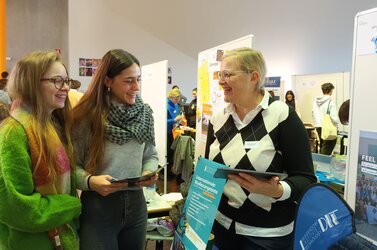
Since 1 January, Deggendorf Institute of Technology (DIT) has been a true hero. Or one of 13 German HEROES, to be more precise. Though not the kind of "heroes" typically associated with the term; here, the acronym stands for "Higher Education for Resilience-Oriented and Empowered Societies". This is a transnational alliance of higher education institutions focusing on promoting the talents of a new generation of EU citizens. With the perhaps heroic goal of strengthening the regional resilience of people, companies and nature.
Ulrike Sauckel, Head of Division Internationalisation at DIT, is very proud to have brought Deggendorf Institute of Technology into this select fold. "The 1.9 million euros in total funding will allow us to get a lot of things done," hopes Sauckel, a DIT employee with vast experience in international university collaborations, adding: "It's about making the university, the teaching staff and the students fit for the future. For a VUCA world, a world shaped by volatility, uncertainty, complexity and ambiguity." It can even be a transformational process for the university and the region alike, she continues. "As regional networking is the focus of European Uni, the region will also benefit from the university's programmes," Sauckel is certain. These programmes are all the result of close cooperation with local stakeholders such as the city, schools, regional development and, of course, also with companies.
By way of example, new, contemporary teaching formats, such as challenge-based learning, will be a focus at DIT. This will be organised in cooperation with companies, but also with other institutions. "Such creative approaches will enable the necessary future skills to be developed and will bring new impetus to teaching at DIT," says Sauckel, adding that other programmes are intended to create inclusion so that the acquisition of intercultural skills no longer depends solely on the size of parents' wallets.
During the funding phase, DIT will be responsible for creating and maintaining the necessary ecosystem, i.e. for all stakeholder groups in and around a university: from pupils to alumni, from companies to environmental protection organisations. Programmes such as HEROESfriends, HEROESalumni, but also the Student Council or the International Advisory Board will be coordinated by the university.
With the "European University Networks (EUN) – National Initiative" programme, the German Academic Exchange Service (DAAD) is lending its support to the EU's "European Universities" initiative. Since the beginning of the year, 13 German universities have been supported in the current and final fifth funding round. They will receive around eight million euros from the Federal Ministry of Education and Research (BMBF) over the next four years in addition to the EU funding. DIT is included in this round.
The European Universities are cross-border university networks that jointly develop teaching and learning formats, new forms of cooperation in education, research and technology transfer and strive for close cooperation with society. They are the brainchild of French President Emanuel Macron and are part of the European Union's Erasmus+ programme.
In the national support programme, the DAAD assists the German universities selected by the EU in setting up European university networks. To this end, the DAAD promotes networking between the universities, helps to reduce bureaucratic hurdles and ensures greater visibility for German universities within the European networks.
The fifth funding round of the national accompanying programme started at the beginning of January 2025. Aside from Deggendorf Institute of Technology, the following German universities will receive up to 600,000 euros in addition to the EU funding over the next four years:
- Bauhaus-Universität Weimar
- Europa-Universität Flensburg
- FernUniversität Hagen
- HTW Berlin University of Applied Sciences
- Heilbronn University of Applied Sciences
- Offenburg University of Applied Sciences
- OTH Regensburg
- TH Köln – University of Applied Sciences
- Chemnitz University of Technology
- Technische Universität Ilmenau
- Technical University of Applied Sciences Würzburg-Schweinfurt
- University of Greifswald
Background European Universities
The European Universities initiative aims to bring Europe's universities much closer together in terms of teaching, research, transfer and innovation. At its core is the vision of a cross-border university. The means to achieving this are especially to involve developing joint study and research programmes, offering cross-campus programmes and the engagement of teachers, researchers and students in intensive dialogue.
Following two pilot calls for proposals, the EU selected the European universities over three funding rounds in 2022, 2023 and 2024. A total of 64 alliances spanning more than 560 participating universities from 35 countries have been established. 66 German universities are represented in a total of 58 alliances. Sustainable funding is currently being negotiated at EU level.
National support programme
Alongside the EU, the DAAD has been supporting German universities on their way to becoming European universities through a national support programme funded by the Federal Ministry of Education and Research since 2020. The programme currently supports 63 German universities that have received prior funding approval from the EU. A total budget of some 39 million euros has been allocated to the national support programme for the years 2024 to2027.
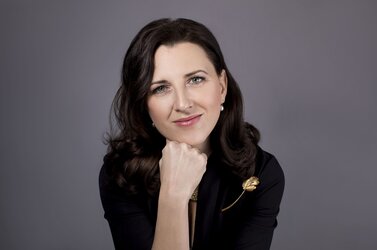
On December 4th the »WomenTech Network« announced the winners for the »Women in Tech Global Awards 2024« at »supercomputing24« in Atlanta, USA. Dr. Helena Liebelt, professor of computer science at the Deggendorf Institute of Technology (DIT) and Technical Program Manager for Quantum Computing at Intel was recognized as one of those winners at the largest virtual awards celebration in technology for women, minorities, and their allies. The »WomenTech Network« is the world's largest community for women in tech with more than 9,500 ambassadors in 179 countries.
This year’s competition featured an extraordinary 1,560 contestants representing 128 countries across 21 diverse categories, showcasing the global influence and reach of the Women in Tech Global Awards. Helena Liebelt won bronze in the category "global technology leadership". Prof. Dr. Helena Liebelt has made significant contributions to the advancement of quantum computing and high-performance computing (HPC). She spearheaded the creation of one of Europe’s first Master’s programs in Quantum Computing and HPC, paving the way for technological progress and equipping the next generation of innovators in this cutting-edge field. Beyond academia, Prof. Liebelt is a passionate advocate for accessible scientific communication, bridging the gap between complex quantum computing concepts and the general public. Her groundbreaking work in quantum algorithm development and application has been a driving force in propelling the industry forward, earning her recognition as a true pioneer in the tech world.
“We are honored to be recognized as a winner at the Women in Tech Global Awards 2024,” said Prof. Waldemar Berg, President of DIT. “This prestigious award highlights our dedication to innovation and inclusion within the tech industry, and we are incredibly proud to be celebrated alongside such remarkable leaders and changemakers in this field.”
In addition to honoring tech leaders, the celebration gave nominees, finalists, and guests access to inspiring keynotes by industry leaders, discussions, and opportunities to network virtually with people from all corners of the world. At the celebration, WomenTech Network has been able to shine a light on the most accomplished and inspiring female tech leaders, mentors, and rising stars from around the world.
"On behalf of WomenTech Network, I would like to congratulate Prof. Liebelt and all of our 2024 winners, finalists, and nominees for their hard work and dedication to making positive change within their communities and in technology. WomenTech Network deeply appreciates your ongoing support for our mission to advance gender equality in the tech industry and celebrate the outstanding success of women on a global scale. We are proud that you are part of our outstanding global community", said Anna Radulovski, CEO & Founder, WomenTech Network.
The event served as an inspiring reminder of the importance of investing in education, training, and resources for women and minorities in tech, so they can continue to help drive innovation in the industry. Some of the success stories from the winners and 700+ influential women in tech will be featured at the world-renowned Women in Tech Global Conference 2025, one of the largest virtual conferences for women working within the tech industry.
About WomenTech Network
WomenTech Network is one of the world's leading communities for women in tech with more than +9500 Global Ambassadors representing 179 countries. +140 000 tech leaders have collaborated with the network to date in order to cultivate a diverse global network that reaches 4.7 million people. WomenTech Network strives to empower women in tech through leadership development, professional growth, and mentorship programs. WomenTech Network hosts regular career networking events and a global tech conference for members to connect with like-minded professionals and learn about job opportunities at leading companies that value diversity.
Learn more about WomenTech Network’s events and programs at www.womentech.net.
About Women in Tech Global Awards
The Women in Tech Global Awards recognize women and organizations making significant contributions to the technology industry through leadership, innovation, and diversity initiatives. Hosted by the WomenTech Network, the awards celebrate individuals and teams driving change and creating opportunities for the next generation of women in tech.
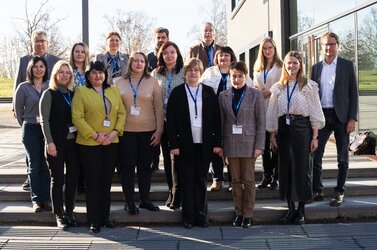
How well are degree programmes set up and how high is the quality of teaching? Insights can be gained from the demand for graduates on the labour market and an analysis of their employment. An expert committee of representatives from universities and the Ministry of Education and Research of the Republic of Moldova is currently working on this issue as part of the UPGRADE project funded by the European Union under the Erasmus+ programme. Delegates visited Deggendorf Institute of Technology (DIT) at the end of November to get to know its service centres and advisory services, which are designed to provide students and alumni with the best possible career prospects.
As an international university, DIT presented itself as a role model for established student offices, alumni work, further education options and support services for those interested in founding a company and for young entrepreneurs. During the five-day visit, the Centre for Studies and the International Office first introduced themselves. Following this, there was an exchange about the work of DIT alumni and the services of the Centre for Academic Further Education. The meeting then continued with the Service Centre for Studies and the Career Service for Cooperative Studies, STEM, and the project coordination for cooperation between faculties and administrative units. Sharing their experiences on internationalisation and integration was also a key topic. Prof. Dr. Marcus Herntrei, Vice President for Academic and Student Affairs, and Prof. Dr. Martina Heigl-Murauer, Vice President for Internationalisation and Integration, took part in a discussion on possible cooperation with the universities from Moldova. Finally, the group addressed the extensive range of support on offer in the areas of start-up and scaling up companies. To this end, the group visited the Startup Campus in Deggendorfer Veilchengasse and the Bavarian Innovation Transformation Centre in Oberschneiding. Here, Vice President for Third Mission Prof. Dr. Veronika Fetzer presented the DIT’s approach to promoting entrepreneurial thinking and action as well as the university's efforts to forge close links with society and business in the region.
UPGRADE pursues the assessment of employability in the national and international environment as well as the improvement of academic education and the provision of information, advice and guidance centres at universities in the Republic of Moldova. So far, the project group has visited several universities and higher education institutions in EU partner countries for surveys, international exchange and discussions on cooperation opportunities. The project aims to develop a concept for a national framework for measuring and improving employability in Moldova to improve the quality of academic education and to deepen international contacts with universities, higher education institutions and companies.
For more information on the UPGRADE project or on cooperation opportunities with Moldovan institutions, please contact Dr. Viachaslau Nikitsin.
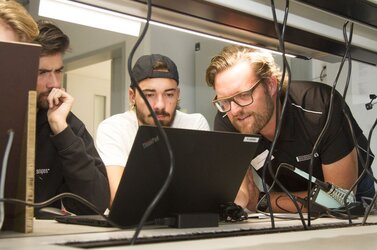
The Deggendorf Institute of Technology (DIT) has been granted the right to award doctorates in the so-called NITRO research area (»Nachhaltige Intelligente Technologien für eine Ressourcenoptimierte Produktion«/sustainable intelligent technologies for resource-optimised production). This was announced by the Bavarian Ministry of Science and the Arts on Tuesday, 16 July. This means that from now on, junior scientists can also do doctorates in this area at the DIT. The first Promotionszentrum ‘Digital Technologies and their Applications (DigiTech)’ was authorized back in October. In both Promotionszentren, the DIT is represented within a network with the Technical University of Applied Sciences Augsburg (THA) and Landshut University of Applied Sciences (HaWL).
Within both Promotionszentren, the DIT has the right to award doctorates. Graduates with a suitable Master's degree in the relevant subject areas are qualified. DIT‘s President Prof. Waldemar Berg reports: „A total of 19 professors ‒ including five from the DIT ‒ are part of NITRO due to their scientific expertise and research strength. They are now authorized to supervise doctorates independently“. Research activities at this Promotionszentrum focus on production systems and processes, product design and materials engineering as well as on technology and innovation. The key topics of sustainability and resource efficiency are an integral part of all focus areas. In particular, the DIT is contributing to the areas of nanotechnology, high-frequency and sensor technologies as well as bionics. „All of these key topics are important foundations for further developing intelligent and resource-efficient technologies and are therefore also indispensable for AI, for instance,“ says Berg.
Prof. Dr. Wolfgang Dorner, Vice President for Research at the DIT, adds: „The aim is for young scientists to conduct interdisciplinary research into new materials, manufacturing processes and methods for environmentally friendly, resource-preserving and economical production and thus to contribute to solving current social, economic and ecological problems“. While 24 doctoral students have already begun their projects within the first Promotionszentrum DigiTech, the first doctoral candidates are expected to be admitted to NITRO towards the end of 2024 or the beginning of 2025. „By establishing the two Promotionszentren, the three Bavarian Universities of Applied Sciences (UAS) are creating perfect conditions for their students‘ academic careers“, Dorner explains. The right to award doctorates at UAS is a logical step towards recognizing the scientific achievements of their researchers and leading excellent students to a doctorate, just like at universities.
As one of the Bavarian UAS which are strongest in research, the DIT can offer young doctoral students an attractive research environment at its many technology campuses. „Doctoral studies at the DIT have a long tradition,“ says DIT President Berg. „A considerable number of young scientists have already been prepared for a career in research and development in Deggendorf and at our technology campuses in the region through cooperative doctorates with universities“. Today, they work in leading positions in research & development departments and in the management of companies or as professors. Berg also adds: „By collaborating with companies, our doctoral students also gain an insight into the importance of research and innovation in an entrepreneurial context and how science, theory and practical relevance interact.“
Today, scientists at the DIT conduct research at 17 technology campuses at twelve locations within the region and beyond. „NITRO will in particular strengthen research at the sites in Deggendorf, Plattling, Hutthurm, Cham, Parsberg, Weißenburg, Freyung, Teisnach and Pfarrkirchen,“ Professor Dorner concludes. This is because research groups and institutes in the fields of materials research, production technology and sustainability research are based there.
Additional information: Doctorate
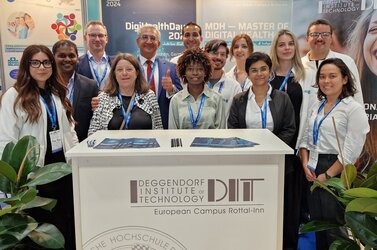
From May 29 to 31, the HIMSS 24 Europe Conference took place in Rome. The European Campus Rottal-Inn (ECRI) of the Deggendorf Institute of Technology (THD) had a significant presence: with a booth, volunteers, and participation in a panel discussion.
The dynamic ECRI booth was a central hub, attracting attendees with presentations on the successful Master of Digital Health program and showcasing innovative health informatics research projects. Highlights included the DigiHealthDay forum. The booth featured the ECRI Digital Health team, led by Prof. Dr. Georgi Chaltikyan, along with Anna Schmaus-Klughammer, Dimitry Etin, Jishen Pfeiffer, and Fara Fernandes.
ECRI's collaboration with the Healthcare Information and Management Systems Society (HIMSS) was underscored by the high number of ECRI volunteers. Nine students, more than half of the volunteer team, assisted in various conference activities, demonstrating strong organisational and communication skills. Student Lusine Shahverdyan praised the volunteer experience for the opportunity to interact with industry professionals and stay updated on healthcare technology advancements.
A highlight was the panel discussion led by Prof. Dr. Georgi Chaltikyan, titled "One Click Too Many - Reducing the Operational Burden on Clinical Staff," focusing on workflow optimisation in clinics through AI and user-friendly data solutions.
ECRI's involvement in HIMSS 24 Europe underscores its commitment to advancing innovation and excellence in digital health education. The annual conference, hosted by HIMSS, brings together industry leaders and cutting-edge technologies.
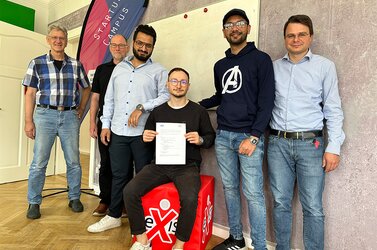
At the beginning of June, the international founding team "future-link" from the Startup Campus of the Deggendorf Institute of Technology (DIT) received an EXIST startup grant of €131,500 for their idea of a retrofit solution for easy machine data collection.
The young founders—Shivam Parmar (India), Ali Aljalali (Syria), and Johannes Bardon (Germany) got to know each other at DIT and have set themselves the goal of offering companies a manufacturer-independent plug-and-play retrofit solution for recording machine data. This should then be able to be used for fully automated process monitoring of machinery. Since older machines often lack the necessary interfaces for data extraction, future-link is developing a product using DIT's patented "Method and System for Machine Data Collection" (DE102019101132). This product enables uncomplicated machine data collection (MDE) without external sensors or existing interfaces. Additionally, the startup offers operational data collection (BDE), which, when combined with MDE, provides a comprehensive overview of the production process. To ensure information security, the data traffic of the system, which runs on Raspberry Pi and Windows, can operate within a completely independent network, separate from the manufacturing operation.
Having moved into the Startup Lab in Veilchengasse, Deggendorf, the three founders now have twelve months to turn their prototype into a market-ready product. Concurrently, they are also working on expanding their business model.
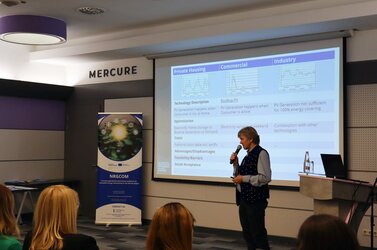
On Tuesday, 23 April, the first national workshop of the Interreg Danube Region project "NRGCOM" took place. It was organised and hosted by the Deggendorf Institute of Technology (DIT) as a partner in the project. The focus was on Energy Communities and how they can best develop in the region.
The NRGCOM project was launched in January and aims to create an environment in which renewable energy communities can flourish in the Danube region. This aim was also addressed by the workshop on 23 April. After the project presentation by Agnes Frank, DIT’s project manager, Prof. Dr. Raimund Brotsack together with Dr. Robert Bauer introduced the topic. A number of examples of good practice from Fuchstal, from the regional power plant in Cham and from the association Bayerische Bürgerenergie were presented. The participating energy communities and local action groups then discussed potential cost-effective infrastructure solutions and technological developments, as well as how the issue will develop in the future. For the participants, the workshop laid the foundation for cooperation with DIT as a partner in the "NRGCOM" project. In the further course of the project, legal solutions will be researched, operating models analysed and a model for creating favourable conditions for energy communities will be developed. The foundations laid at the first national workshop held by the DIT will be further developed on 3 June. This next workshop on business and governance models of energy communities will take place at the European Campus Rottal-Inn.
The national workshop was preceded by a kick-off event. It took place from 12 to 14 March in Budapest and brought together all 13 project partners from a total of 12 countries. The Interreg Danube Region project "NRGCOM" is led by the South Transdanubian Regional Innovation Agency. The overall objective of NRGCOM is to promote energy communities in the Danube region by creating an environment in which community renewable energy initiatives can develop to facilitate the energy transition and increase energy efficiency.
The project runs from 1 January 2024 to 30 June 2026 and is funded by the Interreg Danube Region Programme, co-funded by the EU. In total, there are 13 project partners and 14 associated strategic partners from 12 countries. They will review the (legal) framework conditions, analyse business models and governance techniques, collect best practices and solutions and develop policy recommendations. The aim is to raise awareness of the concept and increase its dissemination in the partner countries through awareness-raising activities. It will also propose legal solutions, analyse operational models and provide training.
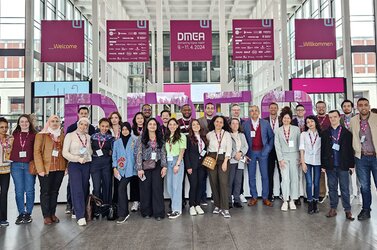
More than 50 students from the European Campus Rottal-Inn (ECRI) visited the DMEA (Digital Medicine Expertise and Applications) in Berlin from 9 to 11 April. The excursion is offered to students of the master’s programme Digital Health and the bachelor’s programme Health of Informatics to get in touch with experts from industry and academia early on in their studies.
For students such as Yasaman Rasouli the DMEA – one of the most important European events for Digital Health – is a chance to discuss current topics and future cooperations in person with experts: “It was fascinating to talk to startup founders about their projects and challenges, and find similarities between their work and students’ ideas about theses or career interests.” The conference offered thought-provoking discussion panels as well as presentations from national and international perspectives on the future of global digital health. The students were able to gain practical insights by testing the latest product developments such as VR-glasses that assist medical staff in diagnostics.
During the event Prof. Dr Georgi Chaltikyan met with Bavarian State Minister of Health, Care and Prevention, Judith Gerlach, and personally invited her to the DigiHealthDayS-2024. At this international symposium for education, research, innovation and networking – hosted annually by the ECRI – experts on DigiHealth gather on campus.
The excursion was organised and accompanied by Prof. Dr Georgi Chaltikyan (Head of the master’s programme Digital Health), Anna Schmaus-Klughammer, LLB(hons) (lecturer and member of academic staff), und Dmitry Etin (lecturer).
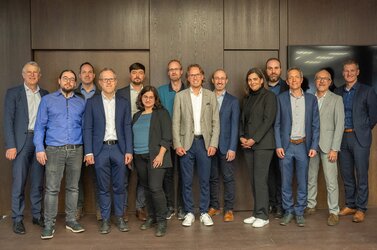
The official opening of the Promotionszentrum DigiTech was celebrated at the Deggendorf Institute of Technology (DIT) on 11 March. Prior to this, in November 2023, the DIT, which had the lead in the application process, was officially granted the right to award doctorates in the field of digital technologies and their application (DigiTech) in cooperation with the Technical University of Applied Sciences Augsburg (THA) and Landshut University of Applied Sciences (HaWL). Master's graduates in the relevant subject areas can now obtain their doctorate at these Universities of Applied Sciences (UAS). Previously, this had been only possible in cooperation with regular universities. DigiTech is the first cross-university alliance in Bavaria to accept doctoral students as early as March 2024.
Two years, a team of ten, eleven faculties, 31 professors with strong research expertise, 51 virtual meetings and 199 pages ‒ this is how Prof. Dr. Roland Zink, Scientific Director of the Graduate School of the DIT, outlines the application process. It was one of the applications that were already approved in the first round and without any additional inspection. The team had developed Doctorate Regulations which embody the highest quality standards for obtaining a doctorate.
The presidents of the three Bavarian UAS ‒ Prof. Dr. Peter Sperber (DIT), Prof. Dr. Dr. h. c. Gordon Thomas Rohrmair (THA) and Prof. Dr. Fritz Pörnbacher (HaWL) ‒ expressed their admiration for the team’s achievements at the opening ceremony. For them, the right to award doctorates is a logical and yet historic step towards recognising the scientific achievements of UAS researchers at the very same level as at regular universities. Prof. Dr. Christian Facchi, Head of the Graduate Center at the TH Ingolstadt and member of the German Science and Humanities Council (Wissenschaftsrat), emphasised in his speech that it is "by no means a second-class doctorate". Rather, it is an opportunity for raising the profile of UAS as teaching and researching institutions with a high level of orientation towards application.
Six doctoral students ‒ two from each UAS ‒ have already embarked on their journey with DigiTech on 1 March. They will be researching in the area of megatrend topics in digitalisation. Prof. Dr. Andreas Kassler, the Steering Committee‘s spokesperson and holder of a Top Professorship (Spitzenprofessur) at the DIT, encouraged them to see their journey ahead as a "springboard for creativity and determination", in which they can always fully rely on the support of the Promotionszentrum DigiTech.
Until the Bavarian Higher Education Innovation Act (BayHIG) was passed in 2022, the awarding of doctorates was the exclusive right of regular universities. Bavaria is the fifth federal state in Germany where it was granted to UAS. The inclusion of the right to award doctorates in the BayHIG was preceded by many years of heated debate between supporters and opponents. Similarly, it was not possible for UAS to conduct any research until 1998. Today, the DIT, the THA and the HaWL are among the strongest research universities in Germany.
Additional information: Promotionszentrum DigiTech
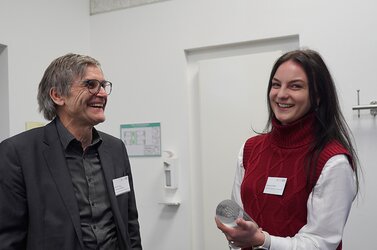
Eight researchers presenting their research projects in only four minutes for each. On the 11th Day of Research, the aim once more was to communicate scientific work such that non-specialists can understand it. The annual event at the Deggendorf Institute of Technology (DIT) was held onsite on 12 March, after having been a pure online event during the past five years.
Conducting research is their main business, but communicating their endeavors and results ‒ to scientists from other disciplines as well as to non-specialists ‒ is something outside of their comfort zone. On the Day of Research, the one presentation which best achieves this aim is traditionally honored with the Best Presentation Award. The three best scientific posters receive Best Poster Awards and bookshop vouchers. Laura Lemberger impressed the audience and especially the expert jury with her concise and fascinating presentation on „The prognostic role of the TSR in PDAC ‒ evaluation of the relationship between the tumor-stroma ratio and the Ki-67 and p53 status in ductal adenocarcinoma“. The glass trophy, which is passed on from winner to winner every year, thus also went to her team under the leadership of Prof. Dr. med. habil. Thiha Aung (DIT), Prof. Dr. Silke Haerteis (University of Regensburg) and Prof. Dr. Christina Hackl (University Hospital Regensburg).
Like in recent years, the posters were designed according to the principle ‘One picture, one caption ‒ research at one glance’. The Best Poster Awards winners were: Nils Rabeneck (TC Hutthurm) with AutoClean, an automated post-processing station for powder-based 3D printing, Mahboubeh Tajmirriahi (TC Vilshofen) with ELISA, an electromobility concept with interoperable and secure architectures, and Lukas Schmidbauer (Health Campus Bad Kötzting) with the topic of cargivers' perceptions of AI.
The other participants also showcased the strength of the research at the DIT with their diverse and fascinating projects: spanning from the Digital Alpine Village, a digitalization concept for a successful, sustainable intermunicipal future in rural Alpine regions (Frank Edenharter) and transcription regulation in malignant melanoma (Zubeir El Ahmad), to projects such as CAIDAN, the AI-supported attribution of cyberattacks in industrial networks (Santhosh Kumar Nataraj) and Greenglass 4. 0, the production of sustainable glass (Andreas Hanninger) as well as C-AFM, approaches for optimization in conductive atomic force microscopy (Jonas Weber). A total of 24 posters were submitted for the 11th Day of Research, which were evaluated by an expert jury of four.
After the presentations, six topic-specific workshops were offered. The aim was to expand networks outside of the DIT and to facilitate knowledge transfer in the form of mutual exchange with partners from professional practice. Andreas Grzemba, who was the Vice President Research and Knowledge Transfer until mid-March 2024, gave the keynote speech. In his presentation, he emphasized how important it is to make research accessible to the general public and to support scientists with formats such as the Day of Research.
Additional information and all posters may be found at Day of Research
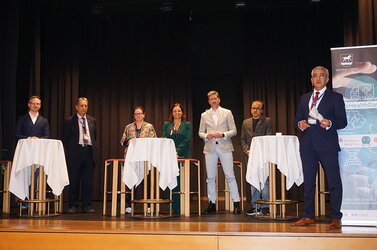
On 9 and 10 November, the fourth DigiHealthDay (DHD) was hosted by the European Campus Rottal-Inn (ECRI). The international scientific symposium received an impressive 1,323 registrations from 105 nations and brought together more than 450 people on-site and online. Academics, students, policy makers, company representatives and digital health enthusiasts came together to discuss the future of technology use in healthcare. The amount of positive feedback marks the DHD as a leading platform for digital health research, education and networking.
Three plenary sessions, three online sessions, fifteen keynote speeches and one panel discussion: the event’s programme – this year focusing on ethics and regulations, innovation, entrepreneurship, and AI research – gave the DigiHealth community a platform to exchange ideas, discuss challenges and spark future collaborations. It was a rare opportunity for on-site attendees whose level of expertise ranged from academic backgrounds to simple interest, to engage directly with some of the world's foremost experts on digital health. International speakers included Dipak Kalra, PhD (United Kingdom), Rajendra Gupta, PhD (India), Anne Snowdon of HIMSS Analytics, PhD (Canada), Miklós Szócska, PhD (Hungary) and Lars Lindsköld, MD (Sweden), to name but a few.
The DHD was particularly impactful for Digital Health students and young professionals, like Ali Badran, Bachelor of Health Informatics at DIT, who says that “[DHD 2023] was a fantastic opportunity to exchange ideas, learn from others, and build connections that will undoubtedly contribute to [his] future endeavors.”
In turn, the speakers and guests were highly impressed by the youthful, diverse and inspiring nature of the DigiHealth family in Pfarrkirchen. “My head is still buzzing from the conversations and great insights shared during the DHD. The energy of the students was contagious, and it makes me very optimistic about the future of digital health”, remarked one of the speakers, Pilar Fernandez Hermida (United Kingdom & United Arab Emirates).
Planning is already underway for the five-year anniversary conference taking place from 4 to 8 November 2024. The DigiHealthDay – initiated by Georgi Chaltikyan, MD, PhD in 2019 – is part of the ECRI’s committment to further research, education and innovation in digital health.
---
More information on DigiHealthDay at https://www.th-deg.de/digihealthday
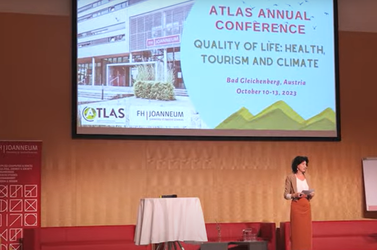
From 11 to 13 October, the international annual ATLAS conference took place in Bad Gleichenberg, Austria, hosted by FH JOANNEUM. Researchers Veronika Jánová and Linn Albert from the European Campus Rottal-Inn (ECRI) presented two projects.
The theme of the conference was "Quality of Life: Health, Tourism and Climate" and offered a multi-perspective view of tourism and a variety of current challenges. In the special track "Quality of Life, Well-Being, Climate Change: Bridging the Theory-Action Gap", Veronika Jánová presented the Interreg Alpine project BeyondSnow. The project is led by Prof. Dr. Marcus Herntrei and aims to increase the socio-ecological climate resilience of small snow tourism destinations and communities at medium altitudes in order to maintain their attractiveness for residents and tourists. In ten pilot regions in the Alps, adaptation strategies to climate change are being developed with the broad participation of local service providers. For the first time, a digital tool is being used to provide data-based solutions and concrete proposals to enable Alpine tourism regions to adapt and revitalise their tourism offer in the face of ecological change. The Resilience Decision Making Digital Tool will generate recommendations for the transition to sustainable tourism models and help preserve valuable regional resources.
As part of the special track "Good Practice in Learning and Teaching Tourism in Higher Education", Linn Albert presented the media and didactic oriented project XtraveL. Led by Prof. Dr. Sascha Kreiskott, the XtraveL team is developing an innovative and transferable teaching module that focuses on practical and theoretical skills for sustainable travel planning and hybrid excursions in higher education. Individual elements can be used by different stakeholders in higher education for planning trips, documenting events or trips, or for teaching and learning practical and future relevant skills.
This year's ATLAS Annual Conference was hybrid for the first time and offered a total of seven special tracks consisting of scientific presentations, simulation games and workshops. Circular Economy in Tourism and Hospitality, Cultural Routes, Sustainable Transport in Rural Areas, Urban Tourism and Well-being, Quality of Life and Climate Change, Good Practice in Learning and Teaching Tourism in Higher Education and Event Crisis Management were discussed intensively by participants from more than 20 countries.
The Association for Tourism and Leisure Education and Research (ATLAS) is a membership-based network and research organisation. Its main objective is to promote tourism and leisure education and research through regular meetings and exchange of information between member institutions.

The European Organisation for Nuclear Research (CERN) is a major research facility of international standing located near Geneva. Every year, the organisation hosts a series of computer science lectures, the CERN Spring Campus, in one of its 23 member states. In March 2024, this event will take place at Deggendorf Institute of Technology (DIT).
“CERN Spring Campus was first held in 2014 and brings CERN’s high-tech knowledge to the Member States. Over the course of four days, experts from CERN will give lectures on computer science and share their knowledge,” says Prof. Dr. Patrick Glauner, AI professor at DIT. Other key elements of the event include a hackathon and cultural exchanges.
Next year’s CERN Spring Campus will take place at DIT from 11 to 14 March. Lectures will cover topics, such as artificial intelligence, IT security, usability, distributed systems and soft skills. The target group mainly consists of bachelor’s and master’s students of computer science or related degree programmes. A limited number of places are also available for university graduates.
CERN first became aware of DIT as a possible event location through Professor Glauner. The former CERN employee is delighted to continue the collaboration: “So far, I have been able to arrange internships at CERN for several of my students. Now, we are taking a further step with the CERN Spring Campus, bringing CERN’s high-tech knowledge to Lower Bavaria.” Participants will also have the opportunity to receive a certificate worth 2 ECTS credits after successfully passing an examination.
More information about the CERN Spring Campus is available at www.cern.ch/springcampus. Applications are now open. If you have any questions, please contact Prof. Glauner directly at patrick.glauner@th-deg.de or +49 991/3615-453.
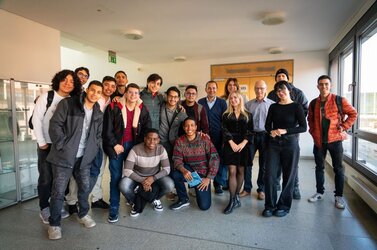
A group of students from Colombia visited the Faculty of Electrical Engineering and Media Technology at the Deggendorf Institute of Technology (DIT) at the end of October. An initiative from DIT and the Colombian University Del Valle made the visit possible. The guests from Colombia were warmly welcomed by the faculty and students of the electrical engineering program and were introduced to cutting-edge research and emerging technologies.
Highlights of the visit included a tour of several laboratories, a meeting with students during a laboratory internship, lectures, and workshops by professors. For Prof. Dr.-Ing. Nikolaus Müller, academic advisor at the Faculty of Electrical Engineering and Media Technology, international exchange programs like these are invaluable: “We are very happy to have these talented students from Colombia with us. This experience will benefit not only them, but our academic community as well.”
Of course, the Columbian students also explored the old town of Deggendorf, tasted traditional Bavarian cuisine and made their first friends. For Juan Pablo Lasso Jaramillo, the trip to Germany was an unforgettable experience: “At the Faculty of Electrical Engineering and Media Technology, the practical implementation of what has been learned theoretically is made possible in well-equipped laboratories. This way you understand everything better and learn much faster. The people we met in such a short time were so welcoming and we will carry these memories in our hearts forever."
The Faculty of Electrical Engineering and Media Technology wants to welcome more international students in the future and establish more relations in the field of electrical engineering. The educational exchange between DIT and the Universidad Del Valle marked the beginning.
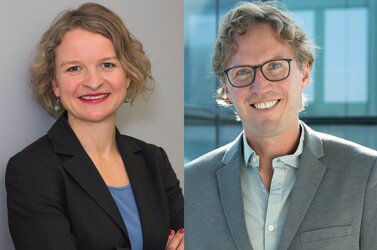
On Friday, 29 September, Bavaria’s Minister of Science and the Arts Markus Blume granted the right to award doctorates for the first time to eleven topic-specific doctoral centres at universities of applied sciences and university cooperations. Among these institutions is Deggendorf Institute of Technology (DIT). Along with the Augsburg Technical University of Applied Sciences and the Landshut University of Applied Sciences, Deggendorf Institute had applied for a doctoral centre focused on “Digital Technologies and their Application (DigiTech)”.
“Our universities of applied sciences and institutes of technology have established themselves as excellent research institutions. Therefore, it is only logical that they should now be granted the right to award doctorates,” says Minister of State Markus Blume, explaining the reason for extending the privilege to award doctorates. Up until now, aspiring academics and scientists were only able to obtain a doctorate at traditional universities. At Deggendorf Institute of Technology, DIT President Prof. Dr Peter Sperber, Vice-President Prof. Waldemar Berg and everyone involved in the project are overjoyed by the approval of the doctoral centre, expressing that is a tremendous honour, a testament to the academic excellence, and a proud achievement for DIT. “Having the autonomy to award doctorates is a great opportunity for all of us,” Dr. Kristin Seffer and Prof. Dr. Roland Zink, the management team of the DIT doctoral centre, confirm. DIT is very appealing to young academics, both at home and abroad, they add, and the university stands out for its high level of applicability.
The technology campuses offer top-notch research opportunities with direct practical relevance. Transfer to business and industry is a standard practice. The DIT’s new authority to award doctorates enhances its appeal, Seffer and Zink find. For the approved doctoral centre, participating professors must demonstrate and prove outstanding research activities. “We are incredibly proud to provide twelve professors from DIT alone for this subject area at the doctoral centre. This demonstrates our strong research capabilities,” Seffer and Zink say enthusiastically. Along with the DIT Vice President for Research, Prof. Dr. Andreas Grzemba, and in close coordination with colleagues from the cooperating universities, they have developed the concept and application for the doctoral centre “Digital Technologies and their Application (DigiTech)” - with success.
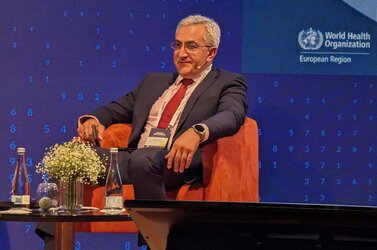
On 5-6 September, the WHO Symposium took place in Porto, Portugal, for the second time in four years. This year, the organisers at WHO invited Professor Georgi Chaltikyan, Head of Digital Health at the European Campus Rottal-Inn of the Deggendorf Institute of Technology (DIT-ECRI), to speak on one of the panels.
The symposium focused on the future of healthcare systems in the digital era in the European region and addressed burning issues facing the industry. The panel on which Prof Chaltikyan was invited to speak was entitled "High-tech vs. high-touch: Can digital technologies mitigate the health workforce crisis?" sought to explore how digital technologies can help address the health workforce crisis. Together with his colleagues, Prof Chaltikyan highlighted the key challenges of digital transformation from a health workforce perspective and the possible solutions to address these challenges.
His presence, together with his colleague from the Digital Health team at DIT-ECRI, Dmitry Etin, marked the ever-growing impact of the Deggendorf Institute of Technology as one of the key pillars of digital health education, research and development in Europe and globally. In addition, a second year student of the Master of Digital Health (MDH), DIT's flagship programme, Ms Airam Regalado Ceballos, was invited to contribute to another panel of students and young professionals entitled "Voices of tomorrow: harnessing the power of youth innovation in (digital) health".
Such a significant contribution by DIT-ECRI to the success of the meeting is in line with the institution's aspirations to become a WHO Collaborating Centre on Digital Health - an important development expected to be completed in early 2024.
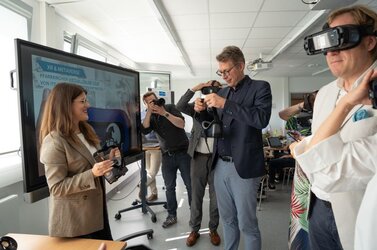
Just ahead of the upcoming winter semester, Markus Blume, the Minister of State for Science and the Arts, paid a visit to the European Campus Rottal-Inn (ECRI) in Pfarrkirchen. During his visit, the minister had the opportunity to gain insights into the six research laboratories, the latest projects, and the reasons why students from a wide array of countries choose this study destination. For the winter semester of 2023/24, ECRI anticipates approximately 1,500(*) new students from around 100 countries across Europe, Asia, Africa, and the Americas. These increasing enrolment figures document the sustained success of the European Campus and its location.
Science Minister Blume noted: “Pfarrkirchen is where the world comes to study. The European Campus Rottal-Inn at the Deggendorf Institute is a true success story. Its special appeal lies in international students hailing from over a hundred countries, excellent academic conditions, and strong support from the local community. Furthermore, the focus here is on themes of the region: health, digitalisation, and tourism. “The Deggendorf Institute is one of our most dynamic universities. This is evident even and particularly here in Pfarrkirchen.”
Upon arrival, Minister Blume was greeted by University President Prof. Dr. rer. nat. Peter Sperber, and Vice President Prof. Dr. Horst Kunhardt and the Dean of the Faculty Prof. Dr. Christian Steckenbauer shared insights into current initiatives. “We hope for ongoing support from the ministry to be able to lead the way in expanding our research and development activities in the future”, Kunhardt said. Students from Greece, Russia, Nigeria, and Iran showcased their tourism projects in the field of Extended Reality, offering virtual tours of Pfarrkirchen using VR glasses. In the “DigiHealth & Smart Tourism Lab,” the latest regional health project, “med4PAN,” was presented: this project aims to improve medical care in rural areas with technical assistance, such as providing defibrillators by drones in cases of acute heart failure. In the “EEE Lab for Electrical and Energy Engineering”, a simulator was used to demonstrate the principle of wind energy generation and to illustrate the functional principle of electrochemical energy storage during the course of the day.
Since October 2015, ECRI has been an international study destination of the Deggendorf Institute of Technology (DIT) and was established based on the state government’s “science-based regional and structural policy”. The primary research and teaching focuses at this campus are sustainability and quality of life in rural areas, which are explored from various perspectives in degree programmes such as Digital Health, Tourism, Energy and Energy Technology, and Healthy Sustainable Building, among others.
(*) Enrolment estimate as of 30.8.2023, subject to change.
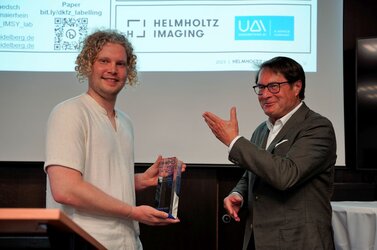
The "Anton Fink Science Prize for Artificial Intelligence (AI)", which has been awarded by the Deggendorf Institute of Technology (DIT), will enter its third round in 2024. Individuals, start-ups, universities, research institutes, foundations or companies can win. The prerequisites are ground-breaking achievements in the research, development or practical applications of artificial intelligence. 10,000 euros will be awarded as the main prize, as well as the young talent award for final theses with 1,000 euros.
"Competitive mechanical engineering, modern services and innovative medical technology are at the core of our prosperity," says pharmacist Anton Fink, explaining his personal motivation to offer this prize again. In addition, the topic of human-machine interaction is particularly close to his heart. "That is why the current call for entries also includes AI applications in the field of human-machine interaction," as Fink mentions. The prize is intended to honour and promote corresponding digital innovations that are concretely used in companies and are methodologically sound.
Applications with projects or research results are accepted from all over Europe. The deadline for applications is 31st January 2024. Applications must include information on the projects or research results, a sketch of the innovation created by them and a curriculum vitae of the applicant.
Individuals aged 18 and older who are resident in Europe are eligible to apply. But also groups or companies that have their headquarters there. However, these must designate a natural person to make the application and take responsibility for it. Submissions are accepted in both German and English.
Prof. Dr. Patrick Glauner, who is primarily responsible for supervising the science prize on the DIT side, is pleased with the latest award-winning AI innovation: "Tim Rädsch from the German Cancer Research Institute and the Karlsruhe Institute of Technology (KIT) convinced us with his world-wide first systematic study on annotation instructions in biomedical imaging." A resulting scientific publication on this topic has also recently been published in an internationally renowned journal.
The award ceremony is scheduled for 14 May 2024 in Deggendorf. The jury includes the former Bavarian Minister of Science Bernd Sibler and the founder, pharmacist Anton Fink himself.
Details on the call for entries are available at www.th-deg.de/ai-prize.
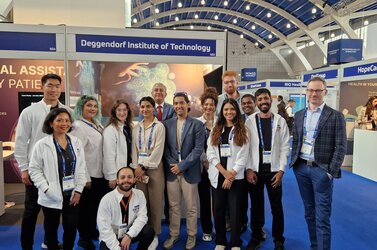
Spring and Summer is always an especially busy season for Digital Health students, teachers and researchers at Deggendorf Institute of Technology’s European Campus Rottal-Inn (DIT-ECRI) with many important conferences and industry expos taking place April through June. Professor Dr. Georgi Chaltikyan, head of the two signature Digital Health Education and R&D products at DIT-ECRI, the Master of Digital Health (MDH) and the annual education and scientific event series DigiHealthDay (DHD), as well as students and research associates, made an impactful appearance at five consecutive events in the end of May – beginning of June.
In mid-May Professor Chaltikyan delivered a master-class to the prospective students of the Armenian double-degree counterpart of DIT-ECRI’s Master of Digital Health launched last year at the Russian-Armenian University in Yerevan, Armenia. The very next day he was invited to speak on a Digital Transformation panel at the Yerevan Tech Forum 2023, a leading event in Armenia.
The week after that, DIT-ECRI students and staff attended Vitalis in Gothenburg, Sweden, the largest and most impactful Digital Health conference and expo in the Nordic Countries. This conference was co-located with Medical Informatics Europe – the annual scientific conference by the European Federation for Medical Informatics (EFMI) of which DIT-ECRI is one of the most active institutional members. Then followed the Pharma 4.0 conference in Berlin, a no less prominent event and conference on Digital Transformation of Pharma where Prof. Dr. Georgi Chaltikyan was the invited chair.
Finally, on June 7-9, one of the most significant European and international events took place in Lisbon, Portugal – the HIMSS 23 Europe congress and expo, where DIT-ECRI actively participated with a dedicated booth, as well as a large group of staff, researchers and students led by Prof. Chaltikyan. Many of the DIT-ECRI students were invited as the conference volunteers amounting to 8 out of 13 HIMSS volunteers. Volunteering at HIMSS23Europe gave the students a unique opportunity to get familiar with the behind the scenes challenges of organizing the event. They gained valuable skills and exciting experience, while those present at the booth engaged in informative conversations with visitors, showcased the university, and achieved new insights into various aspects of Digital Health. The event also featured Prof. Chaltikyan speaking at the panel titled “Harnessing Digital Health Workforce Development”.
For over three years now DIT-ECRI is a partner of HIMSS, with resultant wider recognition of its Digital Health activities in Europe and globally, and many new excellent opportunities for its students and young researchers, to learn, develop, and network with the global Digital Health community.
More is to come: later this year, the annual symposium DigiHealthDay-2023 will be convened on November 10. It is already known that several more global top-level experts and opinion leaders will be speaking at the symposium, including key Digital Health officers from the WHO Europe Headquarters in Copenhagen.
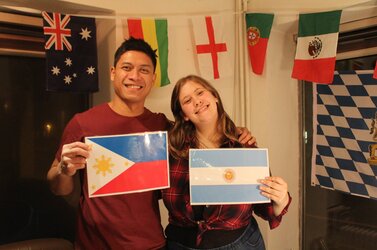
The International Office of the European Campus Rottal-Inn (ECRI) will once again be hosting the KULTURcafé on Wednesday, 21 June at 6 pm. At the event, international students will talk about their home countries. Interested citizens are cordially invited to the KULTURcafé.
In a relaxed atmosphere, ECRI students present their home countries and take the participants with them to foreign cultures. They tell stories about exciting or even curious traditions and customs, answer questions about their home countries and exchange views with the locals on cultural differences and commonalities. The best prerequisites for intercultural dialogue and an entertaining evening with interesting conversations and new insights. Knowledge of English is an advantage. Beverages and snacks from the countries presented will be provided.
Everyone with an interest in other cultures, customs and traditions is cordially invited to the KULTURcafé. This will take place on 21 June at 6 pm in the premises of the Glausbau Verein e.V. in Ringstraße 9 in Pfarrkirchen. The participation fee is €3. Due to the limited number of places, please register with Daniela Schwertlinger (daniela.schwertlinger@th-deg.de or under 0991 3615 8843).
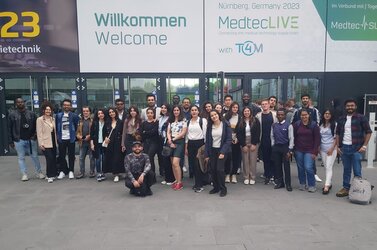
As the use of new technologies in various areas of healthcare continues to increase, it is important to keep up with the latest developments in health IT. Students of the European Campus Rottal-Inn (ECRI) of the Bachelor Health Informatics and Master Digital Health programmes therefore visited MedtechLIVE 2023 on 24 May in Nuremberg.
MedtechLIVE is the central trade fair for medical technology in Europe. For ECRI Digital Health students, the visit to the fair offered the opportunity to acquire new knowledge, learn about the latest developments in the industry and talk to representatives of the medical technology sector. They gained insight into the broad spectrum of medical technology innovations and the latest biomedical technologies and manufacturing processes. The experience gained in Nuremberg can be used by the students in their studies and thus applied directly.
MedtechLIVE took place in Nuremberg this year and brought together 397 exhibitors from 27 countries and around 4,000 visitors from 46 countries. The trade fair picks up on new trends, transfers knowledge and brings medical technology innovations to life.
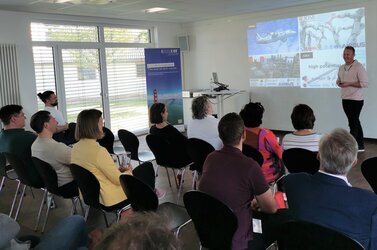
"Without hard work, there is no success even in Silicon Valley!" says Prof. Dr. Tobias Strobl. The topic of his lecture at the Innovation Forum BITZ OPEN on 25 May 2023 in Oberschneiding was "Success factors and risk minimisation for the exponential growth of start-ups - lessons learned from Silicon Valley".
Tobias Strobl completed his doctorate in the field of aerospace engineering at the Technical University of Munich. He is the inventor of several internationally recognised patents, commissioned by the Airbus Group for innovative, all-electric aircraft technologies and has extensive professional experience in start-up, corporate and academic environments in North America, Europe and Asia. He teaches "Methodology of Scale" at the Deggendorf Institute of Technology.
His expertise as a lead mentor at the German Accelerator Silicon Valley, Open Austria and the ITU Seed Technology Accelerator as well as a lecturer at the INSEEC Business School and strategic advisor to several technology start-ups, he brings his expertise as a lead mentor to the Silicon Valley School at BITZ Oberschneiding.
For what reasons are investors interested in a company? What criteria do they use to make their selection? Tobias Strobl answered these questions in his lecture.Why should entrepreneurs always put their product and corporate strategy to the test? First and foremost, it is about understanding customer needs and their requirements and wishes for the product. This must be questioned again and again. No matter how difficult the hurdle is to conduct the so-called "customer interviews". Only the exact knowledge of the customer's wishes guarantees the success of a product. With this knowledge, the product must be further developed and re-tested in order to then start the next validation step.
Anyone who would like to learn more about these topics and the Silicon Valley School is cordially invited to the BITZ Oberschneiding. The BASEBALL, BEER & BURGER summer party is scheduled for 20 July 2023.
The next Innovation Forum BITZ OPEN will take place on 28 September 2023. Prof. Matthias Notz will speak on the topic: Ecosystem Thinking instead of "Mia san Mia". He will show how to create a successful start-up ecosystem in Lower Bavaria and what the "Z" in BITZ stands for. Further information can be found at www.th-de.de/bitz or www.th-deg.de/svp.
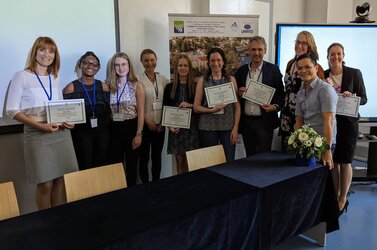
From 25 to 27 May, the Tourism in Southern and Eastern Europe (ToSEE) conference took place in Croatia with the main topic "Engagement and Empowerment: A Pathway to Sustainable Tourism". The European Campus Rottal-Inn (ECRI) travelled to the event with a delegation and contributed three conference papers.
The organisers of the conference, hosted by the Faculty of Tourism and Hotel Management of the University of Rijeka, invited the Dean of ECRI, Prof. Dr. Georg Christian Steckenbauer, to give a keynote speech. In his lecture entitled "The forest as a driver for sustainable tourism development: challenges and opportunities", he addressed the main topic of the conference. Corinna Pippirs and Sebastian Markov, research assistants at ECRI, complemented the topic with their contribution "Forests, health and tourism: developing sustainable health tourism offers in domestic forests". Veronika Jánová, also a research associate at ECRI, presented a research project under the direction of Prof. Dr. Marcus Herntrei on "Sustainable Destination Development in Bavaria: Increasing Tourism Acceptance through Participatory Approaches?" at the conference.
Five students from Pfarrkirchen, who are part of the "Health Tour" project, also came to the ToSEE. This project, led by ECRI and funded by the German Academic Exchange Service, brings together universities in five countries with the aim of making the tourism industry more international and promising for the future..,
The ToSEE conference is dedicated to the promotion of academic work in the field of tourism and contributes to the discussion of current issues related to sustainable tourism development on a global scale. It provides a multidisciplinary platform for teachers, students as well as industry specialists. A total of 111 authors with 44 scientific contributions from 16 countries participated in ToSEE 2023 this year.
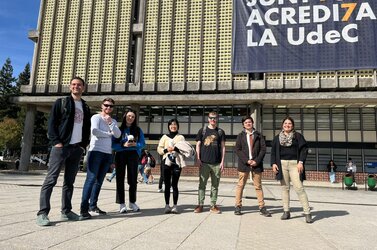
On Thursday, 15 June from 4 pm, the Deggendorf Institute of Technology (DIT), together with the Bavarian Representative Office for South America, will provide information on current events and opportunities for economic cooperation with South America. The virtual English-language event is aimed at interested parties who have had little or no previous contact with this continent.
In "Doing Business in Latin America", DIT and the Bavarian Representative Office for South America will report on previous cooperations of the university with South American countries as well as business and cooperation potentials for companies and interested parties. In addition, Dr. Markus Wittmann from the Bavarian State Ministry for Economic Affairs, Regional Development and Energy will speak about the importance of the South American continent for the regional economy. In the subsequent master class, Pamela Valdivia, Managing Director of the State of Bavaria's representation for South America, will report on how companies can successfully do business in South America. DIT professors Dr Wolfgang Dorner and Dr Javier Valdes will report on current (research) DIT projects in South America. The event will be rounded off by Kathrin Auer, who will talk about the digitalisation college "Progressive Digital Province", in which students from Germany and Chile work on energy-related projects with companies. After the closing remarks by Ursula Brendecke, Deputy Director of the State of Bavaria's Representation for South America, and a question and answer session, the participants can still network.
The event "Doing Business in Latin America" is expressly aimed at people who have had little or no (business) contact with South American countries. Company representatives, self-employed persons, representatives from teaching and research, students and the interested public are cordially invited. Those interested can register online at https://t.ly/ap-nq or by calling Kathrin Auer at 0991/3615-641.
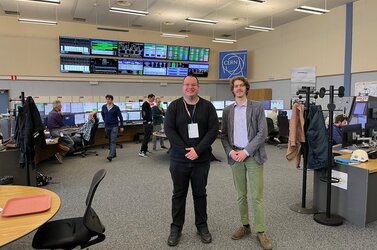
Maximilian von Hohenbühel has been studying Artificial Intelligence at the Deggendorf Institute of Technology (DIT) since 2020. For his practical semester, he was looking for a very special place. Now the student from Deggendorf is working for a year at CERN, an internationally renowned large-scale research facility near Geneva.
Since September 2022, von Hohenbühel has been completing his practical semester at the European Organisation for Nuclear Research, or CERN for short. This is located partly in France and partly in Switzerland. Basic research in physics is carried out there. In particular, the structure of matter is researched with the help of large particle accelerators. The most important one at present is the Large Hadron Collider (LHC), which went into operation in 2008. Von Hohenbühel works there on the development of software for the CERN Control Centre, from which the particle accelerators are monitored and controlled. "The size of CERN," says the 21-year-old, "is impressive. I can actively contribute here and the software I developed is used directly here." Since the previous internship went very well, he was able to extend it. He is now writing his Bachelor's thesis on an AI topic in this environment at CERN.
Von Hohenbühel became aware of the possibility of an internship at CERN through DIT Professor Dr. Patrick Glauner. The former CERN employee sums up his experience there positively: "For me, my three years at CERN were very enriching from a professional and personal perspective." In addition, he says, the time there was a real career accelerator. After taking up his professorship three years ago, Glauner therefore set himself the goal of "establishing a cooperation between the Deggendorf Institute of Technology and CERN". The AI scientist is pleased that these efforts are now bearing real fruit thanks to what is now the second intern. Further cooperation for the next twelve months has only recently been agreed, according to Prof. Glauner.
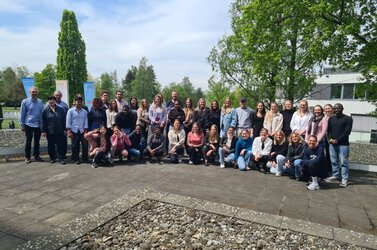
Students of the Bachelor's programme International Tourism Management of the European Campus Rottal-Inn (ECRI) visited the tourism destination Oberschwaben-Allgäu in Baden-Württemberg together with students of the Lucerne University of Applied Sciences and Arts (HSLU) for a field internship. There they gained extensive insight into what the region has to offer, the cooperation between the individual partners and developed product innovations.
The tourism students from both universities travelled to Oberschwaben-Allgäu together with Prof. Dr. Marcus Herntrei and Prof. Dr. Georg Christian Steckenbauer from ECRI and Prof. Roland Lymann and Lisa Fickel from HSLU. The region is not only halfway between Pfarrkirchen and Lucerne, but with its thermal and mud baths and its focus on health tourism, it offers the ideal conditions for a field placement. The aim was to get to know the diverse offer of the region and the different stakeholders such as hotels, spas, tourism destination and municipalities. Among other things, the group visited the Adelindis Therme, the feelMOOR Gesundresort in Bad Wurzach, the Waldsee-Therme health centre and exchanged views with Petra Misch, the managing director of Oberschwaben Tourismus GmbH. This formed the basis for an analysis of the offer by the students, who developed product innovations based on this, coordinated with the tourism master plan of the destination Oberschwaben-Allgäu.
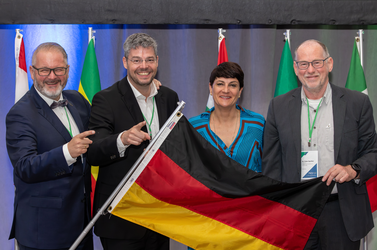
From 15 to 17 May, the World Conference of the Hanseatic League of Universities (HLU) took place in Fort Myers, Florida, USA. There, the Deggendorf Institute of Technology (DIT) and the BITZ Oberschneiding were voted number 1 in the worldwide ranking of the most innovative universities in the field of Entrepreneurial Spirit.
After a five-stage evaluation process, DIT was named the best university in the world in the area of entrepreneurial spirit. With this award, the university prevailed over more than 500 participating universities, including renowned competitors such as Stanford, Berkeley, MIT, Yale, Harvard and TU Munich. The decisive factor for the jury was DIT's 360-degree ecosystem, which is now universal. In particular, the trend-setting developments at the BITZ Oberschneiding, most recently the integration of venture studios for intensive support and financing of teams in the crucial phases of scaling, were judged to be unique worldwide.
The award took place as part of the WURI Ranking (The World University Rankings for Innovation), which was held during the HLU Conference in Florida. The WURI Rankings recognise universities and colleges whose innovative work has had a significant impact on the pressing challenges of transforming technology and shaping the economy and society.
This year, after a two-year break from Corona, the HLU conference was hosted by the renowned Florida Gulf Coast University (FGCU). DIT, with President Prof. Peter Sperber and Prof. Peter Schmieder, opened the Entrepreneurial Spirit part of the conference with a keynote speech and a case presentation.
DIT President Prof. Dr. Peter Sperber was newly appointed to the HLU Board of Directors this year. The reason for this was, among other things, the outstanding ranking successes from 8th, 5th and 2nd place in the years 2020 to 2022. "Even more than for me personally," said President Sperber, "this is a confirmation of the outstanding development of DIT, which thus receives worldwide recognition."
In a final ceremony, the baton was passed from FGCU to Franklin University in Lucerne, Switzerland, which will host the next HLU World Conference in 2024.
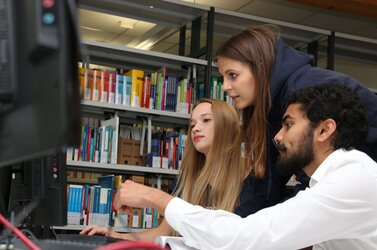
In the recently completed renowned CHE ranking by ZEIT for degree programmes in the field of economics, students voted the degree programmes in Business Administration, International Management, Tourism Management, Business Psychology, Industrial Engineering and Business Information Systems at the Deggendorf Institute of Technology (DIT) into the top group.
"The survey result shows the high quality of teaching at DIT and the satisfaction of the students with our range of courses. Especially in the current application phase, this is a strong signal for all prospective students to apply at DIT. DIT would like to thank the participating students for their positive vote and their good participation in studies and teaching." So says the Vice-President for Studies and Teaching and future DIT President, Prof. Waldemar Berg.
The CHE ranking surveys students from various fields of study every year. This year these were study programmes in economics and related fields such as business informatics and industrial engineering. Other degree programmes were examined in previous years. To land in the top group again this year with 6 examined study programmes shows the success of the constant efforts to improve the quality of studies and teaching. Since 2020, the DIT quality management has been awarded the seal of the Accreditation Council within the framework of a system accreditation.
All of DIT's degree programmes and detailed information on the DIT's degree programmes under review can be found at: https://studiengaenge.zeit.de/studienangebote?suche=Deggendorf.
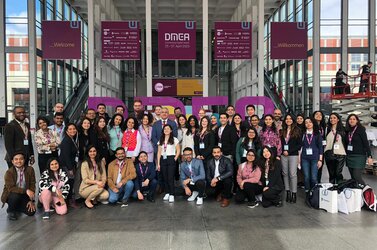
Digital health is becoming increasingly important and is now indispensable. Students of the degree programmes Master of Digital Health as well as Bachelor of Health Informatics, and Master of Global Public Health of the European Campus Rottal-Inn (ECRI) visited the DMEA in Berlin, Europe's most important event in the field of Digital Health, from 25 to 27 April.
The students of the three degree programmes share a passion for Digital Health and Health IT. The visit to DMEA, led by Professor Dr Georgi Chaltikyan, is therefore always the highlight of the year, which is why more than 50 students went along to DMEA in Berlin. At DMEA, they took part in the "Guided Tours", among other things, where they were able to learn about selected key topics on site and get to know the corresponding companies, their products and services. In addition, "DMEA Sparks" offered the students the opportunity to talk to medical institutions and companies in matchmaking sessions and thus get to know potential employers. For Professor Chaltikyan's group, the visit to DMEA was the perfect opportunity to gain a comprehensive insight into the latest developments and trends in the industry. The trade fair provided the perfect environment to exchange ideas about digital health with the community in person. In addition, the students learned about a wide range of opportunities for further education, careers and research in this field and are now well equipped for the future.
The DMEA is considered Europe's leading event for digital health. It takes place annually in Berlin and, with over 700 exhibitors and more than 300 lectures and keynotes, offers the professional audience the opportunity to obtain intensive information and network with international experts. This year, over 16,000 people attended the DMEA.
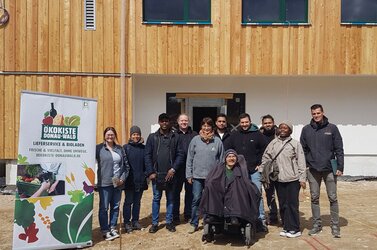
The current developments towards more sustainability and regionality are also making its way to the surface in the construction sector. The Building Products and Processes (BPP) degree programme at the European Campus Rottal-Inn (ECRI) focuses, among other things, on innovations and how individual building products contribute to the overall balance of a building. Students of this degree programme now visited the construction site of a "green" logistics building to experience first-hand what matters.
The students and laboratory engineer Jennifer Huber had been invited by Martina Kögl-Wiethaler, the owner of Ökokiste DonauWald GmbH & Co. to visit the construction site in Saulburg. Together with her son Xaver and the site managers of the company Haas Fertigbau GmbH, Benedikt Bachmeier and Christian Tippelt, she welcomed the ECRI visitors. After a brief introduction of the Ökokiste and its philosophy of ecology and sustainability, Martina Kögl-Wiethaler went into detail about the building under construction. The customer base, which had grown considerably during the Corona period, required a new logistics building including offices and a salesroom. In keeping with the company's philosophy, a sustainable and refined building was to be created. For this purpose, the decision was made to cooperate with the Haas company, which also focuses on regionality.
Site managers Bachmeier and Tippelt took the students on a tour of the construction site. There they went into details about the building, such as packing stations, hygiene areas, the light-flooded social room for employees, the roof terrace and the green roof. They also presented the challenges of how these could be implemented sustainably and in accordance with the customer's wishes. These details were of great interest to the students, who will later work as an interface between construction manager and civil engineer. Especially the photos of the individual construction phases and progress together with the explanation by the construction managers went down well with the students.
After visiting the construction site of the Ökokiste DonauWald and having a snack together, the group continued to Straubing to the company Wienerberger GmbH. There, the students learned about the company and the production steps of roof tiles and were allowed to take a look at production. This is an important step for the budding engineers to familiarise themselves with different building materials. Later on, they will need to know what is important in sustainable, recyclable building products, such as Wienerberger's roof tiles.
The visit to the construction site of a sustainable company headquarters and the subsequent tour of the Wienerberger plant left the students with many new exciting impressions and gave them a varied insight into the professional field.

The Deggendorf Institute of Technology (DIT) is offering lots of excitement, insights, information, fun and entertainment at its Open Day. On Friday, 23 June, all interested parties are cordially invited to the campus of the university. From 1 to 11 pm there will be a varied programme for young and old, university staff, students and all those who want to become one, relatives, citizens from near and far and everyone who fancies an entertaining and relaxing day.
"It's a load off my mind that we can finally hold our Open Day again," confesses DIT President Prof. Dr. Peter Sperber, visibly and audibly relieved. Because there is nothing he likes better than seeing the campus full of people. "We are allowed to stir things up. After all, we now have over 8,000 students at DIT and are one of the largest employers in the region, which is saying something," adds Sperber. The open day gives anyone interested a look behind the scenes of the university, which is so important for Deggendorf Institute of Technology and the region. The DIT faculties and facilities offer countless activities, from lab tours, hands-on projects, lectures and information stands to games for young and old, everything is on the programme. "One afternoon is probably not even enough to discover and experience everything DIT has to offer on this day," organiser Theresa Kappl is sure. The extensive programme booklet will provide an overview and orientation. Everyone can choose according to their taste and interest. And of course there will be plenty of food and entertainment. Guests can enjoy the wonderful ambience on the modern campus right next to the Donaupark until late at night. Two beer gardens, food trucks from the region, live music and a light installation late at night - the anticipation of a beautiful summer day at DIT is rising.
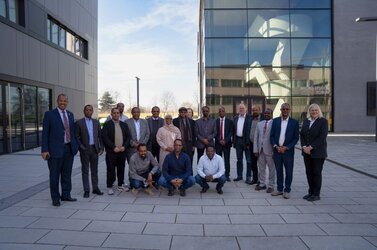
A study trip took 17 university presidents from Ethiopia to the Deggendorf Institute of Technology (DIT) at the end of March. On their trip, they visited several universities to get an image of how universities of applied sciences are run. In Deggendorf, the group learned from DIT President Peter Sperber about the strategic orientation of the university, how professors are appointed and how DIT positions itself as an employer. Ulrike Sauckel, Head of Student Orientation, provided information about digital teaching offers and the practice-oriented focus of teaching. In Teisnach, the DIT guests learned about the Technology Campus concept.
The nine-day study trip of the Ethiopian university presidents was organised and financed by CHE gemeinnütziges Zentrum für Hochschulentwicklung, the Bavarian Research Alliance and the Bavarian Office in Ethiopia. In addition to DIT, visits to the TH Ingolstadt and the Weihenstephan-Triesdorf University of Applied Sciences were scheduled. In May, the deans of the same universities will travel to Germany to restructure their own universities on the basis of what they have learned.
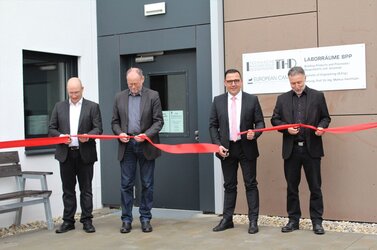
The Bachelor's degree programme Building Products and Processes (BPP) at the European Campus Rottal-Inn (ECRI) ceremoniously opened its new lab rooms in Arnstorf on Friday, 24 March. BPP Students can now complete their lab internships in new and high-quality equipped premises.
The lab was opened by course director Prof. Dr. Markus Hainthaler, DIT president Prof. Dr. Peter Sperber, Arnstorf's mayor Christoph Brunner and the managing director of Gesellschaft für innovative Bautechnologie mbH (GiB) Prof. Klaus Lang, who together cut the red ribbon at the entrance to the building. Afterwards, the guests were welcomed in the lab's co-working space, where they learned all about the premises and the unique selling points of the study programme. The fact that new, modern rooms could be rented is a lucky coincidence for ECRI, because the new building in Pfarrkirchen will take several more years to complete.
After the welcome, the guests were given a tour of the premises. In addition to the co-working space, they visited a room for project work, which was used that day by students to present their work and research results. In the BIM lab, everything revolved around Building Information Modelling (BIM), a working method for the networked planning, construction and management of buildings with the help of intelligent software. The indoor climate laboratory offered, among other things, an insight into the functioning of heat and cold pumps. In the fire protection / building materials lab, the guests learned that building materials are not only about fire protection, but also about UV resistance and component vibration.
Following the lab tour, guests were treated to appetisers and drinks and had plenty of opportunity to exchange ideas and chat with the BPP team about the lab, the degree programme and the lab tour.
The BPP lab houses a total of six different rooms and a co-working space. It is rented for five years with an option to extend for another three years in the GiB premises in Arnstorf and will then move back to Pfarrkirchen in the planned new building.
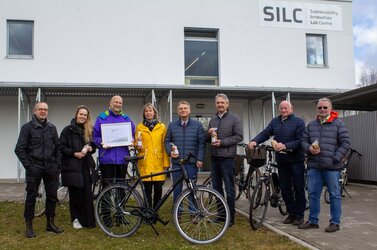
The European Campus Rottal-Inn (ECRI), sustainability campus of the Deggendorf Institute of Technology (DIT), received the "Silver" seal in the EU-wide "Bicycle Friendly Employer" certification. This makes ECRI the second campus in the whole of Bavaria to boast such a certification.
As a sustainability campus, ECRI has for years relied on various measures to make cycling to work more attractive. Last year, already existing offers, such as the "Bike Station", were expanded and extended by a whole concept. Under the direction of the university's sustainability officer, Prof. Dr. Michael Laar, and his research assistant, Laura Hoffmann, staff bicycles and sanitary facilities for cycling employees were introduced and a cycling competition was held. The two were supported by ECRI's sustainability lab. The package of measures was so well received by the ADFC, the German Bicycle Club, that it awarded the university the "Silver" seal of approval in the EU-wide "Bicycle-Friendly Employer" certification process after only nine months instead of the usual two to three years. Petra Husemann-Roew, regional manager at the ADFC national association, says: "The university supports employees who use bicycles to get to work with many different measures. This brings many advantages: The employer can thus score points in company health, environmental and mobility management."
The certification and the measures that go along with it primarily benefit the university's employees. Regular exercise improves health, increases motivation, reduces the carbon footprint and is easy on the wallet. In future, the experiences at ECRI will also be used at other DIT locations to create incentives to cycle to work.

The INTERREG-funded BeyondSnow project is an Alpine-wide initiative involving 13 partners. One of them is the European Campus Rottal-Inn (ECRI) of the Deggendorf Institute of Technology (DIT). The aim of BeyondSnow is to find new solutions for the future challenges of small and medium-sized winter tourism regions. Because decreasing snow reliability and changing consumer behaviour require innovative ideas. One of the ten pilot regions in the Alpine region is the ski area on the Großer Arber.
Climate change is expected to have an impact on Alpine winter tourism at low or medium altitudes. The duration of closed snow cover in the last century has shortened by more than a month. At higher altitudes with high snow reliability, which includes the Großer Arber, an increased rush of skiers can therefore be expected in the future. The winter seasons will become shorter, the costs for the necessary infrastructures to cover the ongoing operations will become more challenging. The viability of winter sports resorts is under great pressure and this may contribute to migration from mountain regions. The winter sports resorts in the Bavarian Forest are also affected by the impacts of climate change. The pilot region around the Großer Arber selected by Beyondsnow is analysed as representative of the Bavarian Forest. In addition, ideas and strategies will be developed on site together with the mountain railway, the districts, the neighbouring communities, the tourism association and local stakeholders.
The BeyondSnow project will work with a total of ten pilot regions throughout the Alpine region to develop instruments to strategically address the challenges of climate change. "The current situation in our mountains," says Andrea Omizzolo of Eurac Research, lead partner of BeyondSnow, "shows the critical state of many winter tourism destinations. The lack of snow is causing great difficulties for the service providers. BeyondSnow aims to make our Alpine-wide selected pilot regions more resilient to climate change. The dependency on snow is to be reduced, visitor management in heavily frequented ski areas optimised and alternatives for sustainable tourism developed. This can be a building block for reducing the threat of migration from rural regions. Exemplary solutions that are jointly developed in the course of BeyondSnow on the Großer Arber can also be useful for many other snow tourism destinations in the Bavarian Forest and in the entire Alpine region".
The BeyondSnow project now has three years to do this. Climate adaptation strategies will be designed in the pilot regions with broad participation of service providers and interested parties. The solutions will focus on the needs of the regional service providers as well as on environmental concerns. Subsequently, BeyondSnow will develop proposals for policy guidelines to strengthen resilience in the Alpine Space. For the first time, a digital tool will be used to provide data-driven solutions and concrete proposals, enabling Alpine tourism regions to adapt and revitalise their tourism offer also taking into account environmental change. This Resilience Decision Making Digital Tool will generate recommendations for the transition to sustainable tourism models and help to preserve valuable regional resources.
BeyondSnow is an INTERREG Alpine Space project co-funded by the European Union. It brings together public and private institutions and experts from the six Alpine countries Italy, France, Switzerland, Germany, Austria and Slovenia, who will jointly develop sustainable development paths, transition processes and feasible solutions for winter tourism destinations. Further details on the project can be found at https://www.alpine-space.eu/project/beyondsnow.
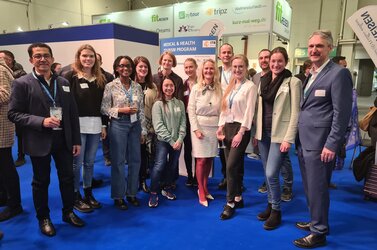
The International Tourism Exchange ITB is finally back after the pandemic and the European Campus is right in the middle of it. A delegation from Pfarrkirchen was also present in Berlin, where tourism professionals and important players in the global travel industry met from 7 to 9 March. Naturally with a special focus on the topics of health and medical tourism.
"The ITB is an excellent opportunity to establish contact between our students and representatives of leading European associations and companies in health and medical tourism," explains the Dean of ECRI and also Pfarrkirchen delegation leader in the capital, Prof. Dr. Christian Steckenbauer. The tourism industry suffers particularly from the shortage of skilled workers, and that sector, which is specifically dedicated to health, is no exception. "Qualified employees are desperately sought after," says Steckenbauer. As a networking event, ITB is a perfect opportunity for the international students at ECRI to make valuable personal contacts for their future careers. In addition, the young people were able to get a taste of the trade fair at the stand of the European Spas Association (ESPA) and actively experience how this tourism trade fair, after all the largest of its kind in the world, is run. Up close, in front of and behind the scenes. The "get-together" at the ESPA Medical & Health Tourism Pavilion was a great experience.
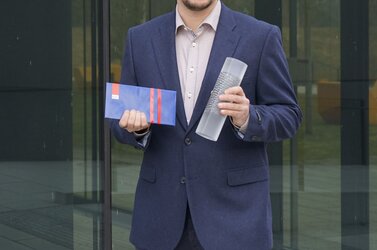
On 23 March, the young researchers from the Deggendorf Institute of Technology (DIT) will once again present themselves to the interested public. At the virtual "Day of Research" between 1 and 3.30 pm, a total of almost 30 researchers will present their scientific projects in short presentations and posters.
"The virtual format has proved very successful for our Research Day," reports Dr Kristin Seffer, Head of Research and Development Services at DIT. In the past, she says, it was particularly difficult for interested companies from further away to fit this date into their tightly packed corporate schedules. "Now everyone can stay at their workstations and easily follow on the computer what exciting research projects there are with us, but also what bright minds are working at the university," says Seffer.
Things get interactive when the best presentation and the three best posters are awarded. Here the auditorium has the choice. For the "Best Presentation Award", the popular challenge cup glass trophy of the Zwiesel Glass School will be awarded again. The complete programme of the Day of Research can be found here: Website. By the way, participation in this event is free of charge. Registration is possible until 22 March 2023.
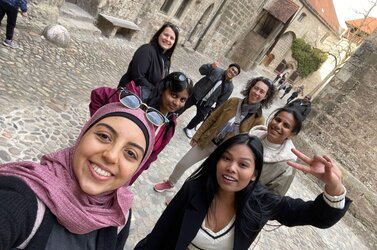
The Host Family Programme of the European Campus Rottal-Inn (ECRI) of the Deggendorf Institute of Technology (DIT) will start again in the coming summer semester. Due to the corona years, the exchange between international students and the local population suffered. As a result, the Host Family Programme unfortunately “lost” some families. This makes the search for new hosts all the more urgent.
“Our Host Family Programme is definitely a successful story,” says Andrea Ebertseder, the organiser of the programme in Pfarrkirchen. “The programme is enriching for everyone – for families as well as students,” she adds. Of course, important ties have been cut through various lockdowns and the associated distance teaching, she says. That doesn’t make it easy now that the university’s students are gradually being drawn back to campus. “But I’m counting on the people here in Rottal-Inn and on their hospitality,” Ebertseder continues. The desired and sought-after contact could happen in any conceivable form. For example, drinking coffee or cooking and eating together. A sightseeing tour in the immediate vicinity could also be a nice opportunity to get to know each other better. “In fact, the students in Pfarrkirchen bring a greater diversity, which the local people also find very pleasant,” Ebertseder adds.
The students all have a room on site, so they are not looking for accommodation. It’s simply about personal contact. They all speak English, and many also speak good German. If you would like to brush up on your language skills or enjoy exchanging ideas with young people, you can contact us at andrea.ebertseder@th-deg.de or give us a call at +49 991 3615 8863. By the way, there is no age limit for the programme. ECRI is looking forward to old and new contacts to families, couples or single people.
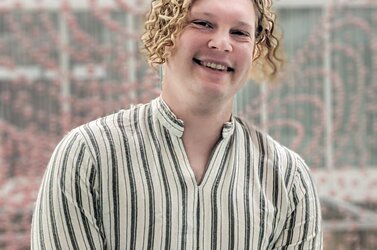
At the end of 2022, the Deggendorf Institute of Technology (DIT) announced the "Anton Fink Science Prize for Artificial Intelligence (AI)" for the second time. Now the prize winner has been announced. It is Tim Rädsch from the Department of Intelligent Medical Systems (IMSY) at the German Cancer Research Center (DKFZ) who convinced the jury the most. He now receives the prize money of €10,000 for his research.
18 AI research teams from Germany and Austria had applied for the Fink AI Prize and did not make it easy for the jury around DIT professors Dr Patrick Glauner and Dr Heribert Popp. In the end, doctoral student Tim Rädsch from the DKFZ in Heidelberg won the race. "Mr Rädsch's thesis was written during his Master's degree at the Karlsruhe Institute of Technology (KIT) in cooperation with the DKFZ. It was particularly convincing and we therefore decided to award him the main prize," reports Glauner. In his submission, Rädsch presented the first systematic study on annotation instructions in biomedical imaging. He was able to show that the quality of the guidance is crucial for the quality of data sets, which form the foundation for AI algorithms. "A resulting scientific paper on this topic was also recently published in the internationally renowned journal Nature Machine Intelligence" Glauner underlines the high quality of the work.
The jury was completed by the former Bavarian Minister of Science Bernd Sibler, DIT President Prof. Dr. Peter Sperber, Prof. Dr. Markus Mayer, FH Professor DI Dr. Stefan Huber from Austria, Assoc. Prof. Ivo Bukovsky, Ph.D. from the Czech Republic and the founder Anton Fink. It also decided to award a young talent prize of €1,000 for the best thesis submitted. Here, the submission of Tri-Thien Nguyen, MD, prevailed. He works as an assistant physician at the Institute of Radiology and Neuroradiology at Klinikum Fürth and at the same time completed a Master's degree in medical technology at Friedrich Alexander University Erlangen-Nuremberg. In his master's thesis, he had implemented an innovative AI-based approach for the detection of an arterial occlusion of the thigh by magnetic resonance angiography.
The donor of the prize, Anton Fink, a pharmacist from Deggendorf, has been associated with the DIT for many years. "With the AI Prize, I would like to make a contribution to strengthening teaching, research and development," says Fink. The award ceremony will take place at DIT on the morning of 11 May 2023, together with several AI expert lectures.
More information on the DIT's AI Prize can be found at www.th-deg.de/ai-prize. If you have any questions, please contact Prof. Glauner directly at patrick.glauner@th-deg.de or +49 991 3615 453.
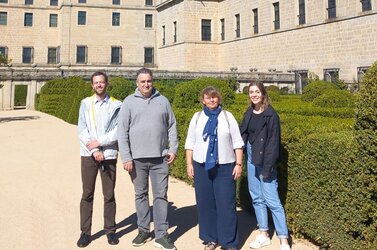
For students in the field of tourism, financial management often plays a major role after graduation. The finer points of financing, however, are not always easy for students to learn. The international FinTour project devoted itself intensively to this topic for two years and published the results in the form of an interactive online course just in time for the end of the project on 28 February.
For the FinTour project, the Deggendorf Institute of Technology (DIT) joined forces with the Prague University of Economics and Business and the Universidad Europea de Madrid. In two years of intensive cross-border cooperation, the participants have developed an online self-study course, the first part of which introduces students to the theoretical background of finance. The second part integrates the view from practice and describes the specifics of financial management in the different facets of tourism enterprises. The online course in English consists of twelve lessons and invites students to study independently. In addition to digital presentations, there are numerous examples, case studies and video and audio interviews.
For the DIT team, it was particularly important to design an engaging and interactive course that transitions well between the individual learning units and always guides students to participate through interactive H5P elements. In addition, experts from industry and academia are involved in all lessons - providing valuable and up-to-date contributions in the form of case studies and podcasts. The participants of the online course thus receive first-hand information on tourism focal points such as restaurants, hotels, travel agencies, offers from travel guides, event agencies or even spa businesses, always with a focus on the underlying financial characteristics. The course will be used in time for the start of the summer semester on 15 March in the Master's programme International Tourism Development at the European Campus Rottal-Inn (ECRI) in Pfarrkirchen.
The head of this project at DIT and ECRI is Prof. Dr. Robert Feicht. He summarises his main motivation for this cross-national and cross-university project as follows: "We have noticed that not all students in tourism have a penchant for numbers. With our course offer, we not only want to sharpen the basic quantitative understanding, but also apply it directly to relevant areas in tourism. In the end, it is always about the return on investment - also in tourism."
The FinTour project ran from 01 February 2021 to the end of February 2023 and was financed through the Erasmus programme "Partnerships for Digital Education Readiness" with funds from the EU. International cooperation is a key element: in addition to the Deggendorf Institute of Technology, the University of Economics and Business in Prague and the Universidad Europea in Madrid are also involved.

From 7 to 11 June, the campus of the Deggendorf Institute of Technology (DIT) will be rocking and rapping again. Five days of open air feeling at the Stadt-Land-Fluss Festival. With Silbermond – German Pop band – (7 June), Stahlzeit – Rammstein tribute show – (8 June), Saltatio Mortis – German medieval band – (9 June), Dicht & Ergreifend – Bavarian Hip Hop – (10 June) and Spider Murphy Gang – Bavarian Rock’n’Roll band – & Kapelle Josef Menzl – German brass band –(11 June), all the acts have now been confirmed. The ticket sale has already begun.
The Campus Festival at DIT is a little different. Because the offer from organiser Power Concerts from Burglengenfeld is not only aimed at the students in Deggendorf. The whole region is involved. "Young and old and middle-aged. Everyone should get their money's worth at Stadt-Land-Fluss," explains Arthur Theisinger from Power Concerts.
Tickets are available at all known advance booking offices or online at www.der-kartenvorverkauf.de. Up-to-date information is available on the university website at slf.th-deg.de.
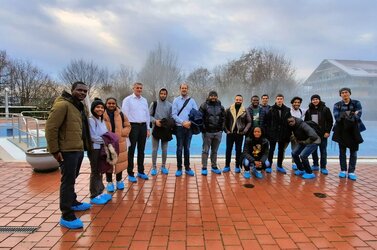
Students from the Industrial Engineering and Energy Systems Engineering study programmes from the European Campus Rottal-Inn (ECRI) worked on a project to develop concepts for a more sustainable energy supply for the thermal spa in Bad Griesbach. They have now presented the results to the spa management.
The spa triangle with its spas is an important economic factor for the region. Due to the current shortage of natural gas, the reduction of energy consumption and the use of alternative energy sources is becoming increasingly important for the neighbouring spas. As part of a student project, Prof. Dr. Matthias Huber looked for solutions together with the ECRI students. To this end, they carried out simulations of energy consumption and investigated the overall effect of the reduction in gas consumption necessary in the interests of sustainability. Combinations with renewable energies, such as electricity from photovoltaics, were also used. Based on the simulations and the testing of different variants, the students were able to come up with various ideas for reducing energy consumption.
The students presented the results of their project work to the spa management after a tour with a look behind the scenes of the feel-good spa Bad Griesbach. The concepts were discussed together and tested for feasibility.
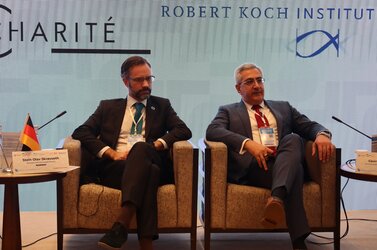
In December 2022, Prof. Dr. Georgi Chaltikyan from the European Campus Rottal-Inn (ECRI), was invited to participate and contribute to the 1st Central Asian Regional Meeting on Telemedicine that took place in Tashkent, Uzbekistan.
The event consisted of two days with extensive workshops attended by healthcare and technology specialists from all over Asia. The goal was to establish a cooperative framework, both among the Central Asian countries, and with the European partners, to develop and implement a cross-border telemedicine network in Central Asia. Prof. Dr. Georgi Chaltikyan was invited by the Robert Koch Institute and the WHO Regional Office as an established international telemedicine expert, to contribute to the analysis of the existing situation, and to help develop the roadmap for this framework.
During the 1st Central Asian Regional Meeting on Telemedicine participants presented their multi-faceted experience, exchanged ideas, and developed a preliminary roadmap of a regional telemedicine network project. They analysed different aspects of such a major telemedicine programme, including needs and requirements, capacity building and education, the technical aspects and interoperability, as well as regulations and the legal requirements. To work out the framework there were panel discussions and participants could join four different discussion groups. Prof. Chaltikyan not only participated in a panel discussion, but he also led the activities in the working group on capacity building and digital health education. At the end of the event, the participants jointly approved and signed a Declaration of Commitment to develop telemedicine and digital health in the Central Asian republics. It is expected that similar activities will be taking place in the next years, to result in the establishment of a functioning and sustainable regional telemedicine programme. Such experience can then be dublicated in other regions of the world.
The 1st Central Asian Regional Meeting on Telemedicine was attended by about 100 healthcare and technology specialists from all five Central Asian republics: Kazakhstan, Kyrgyzstan, Tajikistan, Turkmenistan, and Uzbekistan, as well as from Iran. It was jointly organised by the Deutsche Gesellschaft für Internationale Zusammenarbeit GmbH (GIZ), the main German development agency, the Robert Koch Institute, which is the public health institute in Germany, and Charité – Universitätsmedizin Berlin, one of Europe’s largest university hospitals, affiliated with Humboldt University and Free University Berlin. The local organisers were the Ministry of Health of the Republic of Uzbekistan and the Department of Management of Advanced Medical Technologies in Uzbekistan. Other prominent actors were the WHO’s Regional Office for Europe, and the Norwegian Center for eHealth Research based at the University of Tromsø.
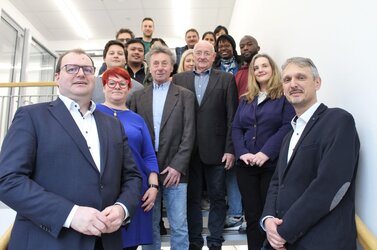
For two years, everyone has been talking about the pandemic. But how do you communicate this or other health-related topics correctly? Students from all over the world explored this question at the Global Public Health Winterschool at the European Campus Rottal-Inn (ECRI) from 10 to 17 January 2023.
About 30 students from all over the world travelled to Pfarrkirchen for the winter school, which was offered as part of the Global Public Health (GPH) degree programme, and the same number joined virtually during the week. The event was themed around communication, which is an integral part of the work of any health authority. Among other things, the focus was on intercultural communication and how to takes place through health campaigns, scientific communication and addressing political actors. But the topics of social media in health communication was also on the agenda. The organizer of the winter school and head of the GPH Master’s programme, Prof. Dr. Sabine Dittrich, had brought in renowned reinforcement. With Dr Charlotte Hammer from Camebridge University in England and Edgar Gonzales from the International Federation of the Red Cross and Red Crescent Societies in Switzerland, international experts contributed to a successful week.
In addition, the students visited the State Office for Health and Food Safety (LGL) in Oberschleißheim together with Prof. Dittrich. They learned more about the German reporting system for infectious diseases from local epidemiologists and microbiologists. As the motto of the winter school was communication of health-related topics, the experts from the LGL went into detail about local health issues and how these were communicated with the population and the professional audience.
Outside of the courses, the students had enough programme to get to know the area and the Lower Bavarian culture. During an excursion to Passau, a joint bowling evening and a Bavarian snack, the participants had a lively exchange, true to the motto of the winter school. One of the highlights was the dinner in the restaurant of the town hall, which was made possible by the generous financial support of the ECRI Förderverein, the district of Rottal-Inn and the town of Pfarrkirchen.
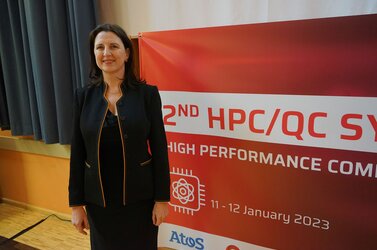
The Deggendorf Institute of Technology (DIT) started the year with a two-day international conference. Three renowned speakers and nine expert companies from industry accepted the invitation from Dr. Helena Liebelt, Professor at the Faculty of Applied Computer Science, on 11 and 12 January. They shared their experiences with around 70 participants on the future topic of "High Performance Computing (HPC) and Quantum Computing". The highlight of this conference was that the companies had worked on their presentations together with students from the university during the winter semester.
Quantum technology in connection with high-performance computing, as it is called in technical jargon, is a trend-setting innovation driver in industry. Especially in mechanical engineering as well as in the chemical and health industries, these are playing an increasingly important role. The contents of the HPC symposium, which took place in the Deggendorf Stadthotel in presence and parallel online, were wide-ranging. They included the presentation of innovative data centres, CPU technologies, requirements for artificial intelligence in healthcare or complex customer problems, calculating precise weather forecasts or the architecture of a cooling system for data centres.
"All the students," explains Liebelt, "worked closely with the renowned HPC/QC experts and used the direct exchange as an opportunity to network. Not only on a content level, but of course also on a professional level." The latter was a valuable side effect that the young people very much welcomed, as the DIT professor reported.
The crowning glory of the conference was the live feed from Prof. Dr. Anne Matsuura in the United States to announce the two winners of the world's first Intel Quantum Computing Challenge.
The Deggendorf HPC Symposium took place for the second time this year. Since quantum technology is a very broad field and many new developments and innovations can be expected for the participants and students in the future, the series is to be continued. All participants also agreed that this symposium is a successful platform for motivating students, bringing them closer to practice and acquiring them as future employees.
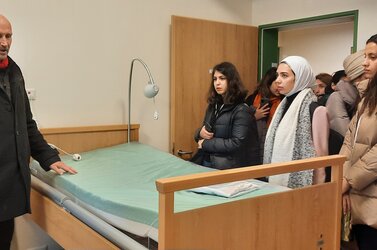
Students of the Master’s programme Healthy and Sustainable Buildings (HSB) at the European Campus Rottal-Inn (ECRI) visited the Pichlmayr Senioren-Zentrum Pfarrkirchen. They learned about the challenges of living at old age and how these are incorporated in their work as experts for healthy and sustainable building.
During the excursion, the group led by Prof. Dr. Michael Laar explored the premises, which were still empty at the time. The students were guided through the building by employees of SH Projekte, the company that planned the centre. Particular attention was paid to the structural requirements that the age of the residents brings with it and how the students can incorporate these into their work in the future. As experts for healthy and sustainable building, the students are trained, among other things, with regard to the residents and what requirements they have for the buildings. The visit to the Pichlmayr Senioren-Zentrum was therefore an important experience for the students. Since structural measures must also function well in real operation, the facility management was also present during the visit and answered the students’ questions about the facility’s care operations.
The senior citizens’ residence was only recently completed and has been accommodating its first residents since the end of November. Since the HSB students were able to visit the facility shortly before moving in, it was possible to take a look behind the scenes and into all areas.
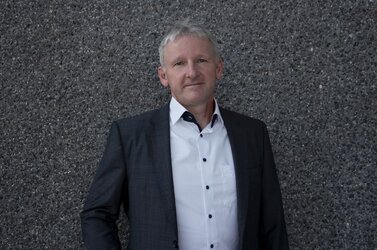
The Deggendorf Institute of Technology (DIT) has developed a new Master’s programme that focuses on electromobility. In 2022, electromobility has noticeably gained momentum in the German automotive industry. It is the key to climate-friendly mobility. There is still a lot to be done to ensure that the transition to e-mobility finally succeeds. The university will train the right engineers from the summer semester of 2023.
The main topic of the Master’s degree are the design and function of the drive systems as well as the charging structure and the energy components battery and fuel cell. A high proportion of practical teaching units was important to the makers. For even more practical relevance, course director Prof. Dr.-Ing. Frank Denk even brought the student association “Fast Forest” on board. Students from all disciplines come together to develop and realise racing vehicles. Depending on their personal interests, students of the Master’s in Electromobility can choose between two focus areas. The programme is recommended for graduates with a Bachelor’s degree in electrical engineering, information technology or related subjects. The application deadline for the summer semester is 15 January. All information can be found on the university’s website: www.th-deg.de/em-m-en
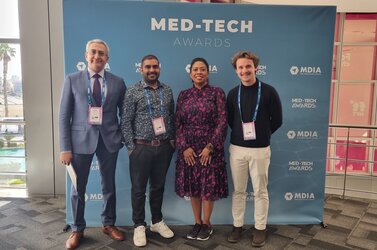
The MedTech World Summit 2022 took place in Malta this year. Prof. Dr. Georgi Chaltikyan participated in the event as the representative of the European Campus Rottal-Inn (ECRI), as a speaker, and host, and laid the ground for a possible future cooperation with the University of Malta during the summit.
Prof. Dr. Georgi Chaltikyan - the coordinator of the Master of Digital Health at ECRI - was invited to chair and host two panel discussions with participation by several distinguished experts and leaders. The panel on the first day of the MedTech was titled “Diversity, Equity and Inclusion in Data” and explored the risks of bias and unethical use of data, as well as the necessary approaches to ensuring the equitable and ethical usage of healthcare artificial intelligence. The second panel on the following day named “The AI Clinician” provided invaluable insights into the future of the artificial intelligence applications in healthcare, the hurdles and limitations to their use, and their potential in transforming the healthcare practices. Both panels received significant interest by the audience and very positive acclaims.
In between the informative congress sessions, Prof. Dr. Georgi Chaltikyan met with a number of peers and fellow-professionals, and established a good ground for a very promising collaboration between ECRI, and important digital health actors. In particular, he had an extensive discussion with his colleagues at the University of Malta who have also launched a master’s program in Digital Health one year ago. The academics from both institutions decided to explore potential cooperation aspects, to jointly advance the digital health education in Europe and worldwide.
The Malta MedTech World Summit – Connecting the Future of Healthcare, focuses on the leading innovations in emerging tech revolutionising the European medical ecosystem. With nearly 3,000 attendees, hundreds of exhibitors, and dozens of top-ranked experts in attendance, the forum provided an exciting view into the current state and the future of digital health in Europe and globally.
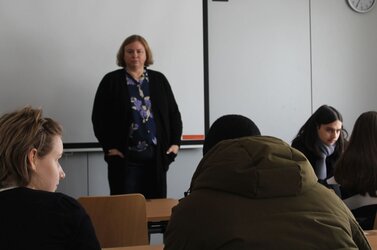
An early Christmas present awaited the pupils of the Gymnasium Pfarrkirchen (GymPan). They visited the European Campus Rottal-Inn (ECRI) in Pfarrkirchen on 20 December and were allowed to attend lectures in English, just like normal students.
The grammar school students of grades 11 and 12 were welcomed at ECRI by Prof. Dr. Michelle Cummings-Koether, who, together with GymPan teacher Kerstin Hofstett, guided them through the day. The students attended a total of four lectures from different subject areas. Each lecture lasted about 30 minutes and was rounded off with a discussion afterwards. The fact that these, like the lectures, were held in English was not a hurdle for the participating high school students, but a welcome change.
The main theme of the visit to the campus was interculturality. Therefore, this aspect was discussed in depth by all participants after the attended lectures. Particularly exciting was the question of how the various topics of the lectures can trigger intercultural interaction or even complications and how one can become aware of them. This was lively discussed by the high school students.
The cooperation between ECRI and GymPan, which allows high school students to attend lectures, was initiated by Prof. Dr. Cummings-Koehter and Kerstin Hofstett and will now be held every semester.
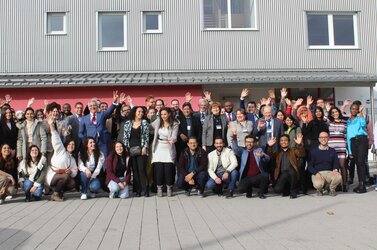
This year’s third edition of the DigiHealthDay (DHD) series received a total of 1.000 registrations from 100 nations around the world and brought together more than 400 people on-site and online, including ten keynote speakers, prominent dignitaries, experts, students, and digital health enthusiasts, exceeding by far any other event held so far at the European Campus Rottal-Inn (ECRI), a faculty of the Deggendorf Institute of Technology (DIT).
The international scientific symposium kick-started with an inspiring opening session featuring welcome addresses by Honorable Klaus Holetschek, the Bavarian State Minister of Health and Care; Wolfgang Beißmann, the Mayor of Pfarrkirchen; Prof. Dr. Horst Kunhardt, the Scientific Chair of DHD, DIT's Vice-President and Founding Director of ECRI; Prof. Dr.Dipak Kalra, the Invited International Chair of DHD; Dr. Ryan Dos Santos, the Digital Health Officer at WHO Europe Office; and Prof. Dr. Yunkap Kwankam, the Executive Director of the International Society for Telemedicine & eHealth (ISfTeH).
The DHD-2022 not only wrapped together two plenary sessions and three parallel sessions, but culminated in the enrichening and enlightening panel discussion. The discussion titled “DigiHealth-AI Quo Vadis: How to Make Healthcare AI Safe, Efficient, Ethical, Explainable, and Accountable?” was professionally moderated by Prof. Dr. Georgi Chaltikyan, Chief Organiser of the DHD-2022. Lively, interactive, and stimulating, the panel attracted much interest by all the attendees, provided a logical conclusion of what the organisers describe as a “360 Degree Immersive Digital Health Experience”, and set the stage for the next edition of the symposium, the DigiHealthDay-2023, traditionally scheduled on the second Friday in November next year.
The breakthrough moment of this year’s DHD has been the in-person visit of five speakers from three continents, including renowned global digital health leaders and academics such as Prof. Rajendra Pratap Gupta from India, Dr. Anne Snowdon from Canada, and Prof. Martin Gerdes from Norway. An opportunity to meet several of the world’s top-ranked experts in-person, to hear and learn from them, to interact with them in and out of the conference rooms, and to even plan future joint projects, was tremendously appreciated by the on-site attendees, and in particular, by the Digital Health students and young professionals at DIT-ECRI, for many of whom this was the very first live exposure to the global digital health community. In turn, speakers and guests highly acclaimed the young, diverse, vibrant and dynamic DigiHealth family in Pfarrkirchen, and unanimously called it one of the most devoted, attractive, inspiring, and energising communities of future Digital Health leaders they have ever met.
Another important feature in this turbulent time, has been the visit of a delegation from the partner university in Ukraine, the National Healthcare University in Kyiv, lead by Prof. Dr. Ozar Mintser, one of the pioneers of medical informatics in Eastern Europe, who have made it all the way from the Ukrainian capital Kyiv to Pfarrkirchen, to contribute to the DHD-2022.
The event ended in the evening with a delightful after-event reception, the “DigiHealthEvening”, that provided the on-site community within the DigiHealth-DIT-ECRI family an ambiance for networking, enjoyment, and celebration with awards, drinks, snacks, music, and many beautiful surprises. The positive vibes sent by the DHD continue reverberating even weeks post-event as witnessed by the overwhelmingly positive feedback and testimonials that the organiwsers are still receiving.
The DHD-2022 was kindly supported by its sponsors SHL Telemedizin GmbH, the Premier Sponsor, and ITD GmbH. The following partners also contributed to the great event: Bavarian State Ministry of Health and Care (StMGP), Healthcare Information and Management Systems Society (HIMSS), International Society for Telemedicine & eHealth (ISfTeH), Consortium of Educational Institutions in Digital Health (CONEDIG), International Medical Informatics Association (IMIA), European Federation for Medical Informatics (EFMI), German Society of Digital Medicine (DGDM), German Telemedicine Society (DGTelemed), Bavarian Telemedicine Alliance (BTA), Armenian Association of Digital Health (AADH), District Rottal-Inn, and City of Pfarrkirchen. As partner universities DHD is glad to have had the Russian-Armenian University (RAU), the Peoples' Friendship University of Russia (RUDN) and Shupyk National Healthcare University of Ukraine (Shupyk NHU of Ukraine) on its side. DigitalHealthNews.eu contributed to the big event as DHD’s media partner. The Munich Digital Health Summit teamed up with DHD-2022 and supported the symposium as a partner event. The DHD-2022 has the Journal of Applied Interdisciplinary Research (JAIR) and the Ukrainian Journal of Medical Informatics and Engineering as its publication partners.
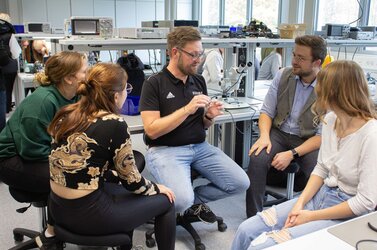
The European Campus Rottal-Inn (ECRI) offered pupils from the Pfarrkirchen Vocational School an insight into the laboratories and study programmes at the campus for the first time. During the visit, the prospective specialists learned about new technologies and their applications and took away a lot of knowledge for their future work.
A total of 66 students from the Pfarrkirchen vocational school came to ECRI. They were accompanied by teachers Johann Zeilberger, Aylin Gonnert and Stefanie Plöchl. After the welcome by the ECRI Dean, Prof. Dr. Georg Christian Steckenbauer, the students were given insights into the possibilities of study orientation at the campus as well as the new degree programme Building Products and Processes in short lectures. This was important information for the future specialists, as it will enable them to offer comprehensive advice on orientation, further education or dual studies in their future work.
Afterwards, they were divided into three groups, which took turns at the activities on campus. From then on, the students faced the challenge of the English language, which is used in all lectures and the labs at ECRI. The DigiHealth & Smart Tourism Lab station made the most impression on the participants. They learned about different digital technologies. The students were allowed to try out a variety of iHealth devices such as the iHealth Air pulse oximeter, iHealth View for measuring blood pressure and pulse or iHealth Feel for monitoring blood levels. The most impressive feature was eye tracking, which can be used to read people's emotions. Used correctly, this technology can be extremely helpful for the future specialists in their future jobs. As student Marc Luco describes, it could be used to find out what supervisors look for in job interviews, what impressions make the difference or whether reactions differ depending on the age or gender of the applicants. He is sure that eye tracking will expand his everyday professional life in a few years.
In the EEE Lab, the laboratory for electrical and energy engineering, the pupils were allowed to carry out soldering experiments on circuit boards themselves. In addition, the lab engineers presented them with the model of a heat pump and explained how the lab's own 3D printer works.
ECRI student Hashem Alshawabkeh showed the prospective labour market services specialists important on-site facilities such as the canteen and the library during the campus tour. In lectures such as Scientific Writing, Standards of Green Buildings or Engineering Maths, they got an impression of teaching at ECRI and in Healthy and Sustainable Buildings, the HSB Lab, they got a taste of sustainability, a pillar of ECRI. During the tour, the students were able to address their questions directly to the student and thus exchange ideas at eye level.
In addition to an overview of ECRI's offerings and opportunities, the laboratories and facilities on campus, the students from the Pfarrkirchen vocational school benefited above all from the technologies and their diverse applications, which they learned about during their visit and will use later in their professional lives.
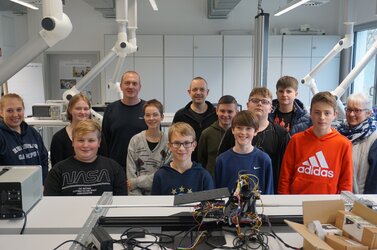
On 23 November, pupils from the Realschule Pfarrkirchen (RS-PAN) visited the European Campus Rottal-Inn (ECRI) for a soldering practical. The knowledge and skills acquired there will be used in the RS-PAN's event workshop in the future.
As part of a cooperation between the ECRI and the RS-PAN, in particular the school's events group, nine pupils visited the campus to complete a soldering practical. The participants of the AG had previously received a technical introduction by Prof. Dr. Sascha Kreiskott. They learned how to disassemble a loudspeaker and check the individual parts for function before reassembling all the components. There they had learned how to systematically check the function of supposedly defective devices that had therefore been sorted out. It turned out that one loudspeaker was simply set incorrectly and therefore made a lot of noise. The pupils had also learned from Prof. Kreiskott how to check cables, which are used in the AG.
In the subsequent soldering practical at ECRI, the members of the event AG were introduced to the finer points of soldering. The aim is that in future the pupils will be able to repair the cables and technology used in the AG themselves by soldering. This way, they can continue to use them and do not have to buy new ones. The pupils' soldering skills directly benefit the environment. Before getting to work on the cables, the participants were allowed to try their hand at soldering a "Wonkey Wire", the game known in Germany as hot wire.
The soldering practical, led by Prof. Dr. Sascha Kreiskott and teacher Stefanie Kolb, took place in the EEE-Lab, the laboratory for electrical and power engineering, at ECRI. They were supported by laboratory engineer Carola Ebner and Stefan Hofbauer. The soldering kits used were provided by the TfK - Technik für Kinder e.V. association.
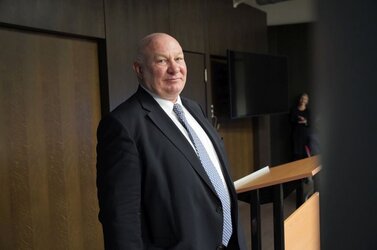
On 24 November, the course was set at the Deggendorf Institute of Technology (DIT) for the time after President Prof. Dr. Peter Sperber. The University Council has now elected Professor Waldemar Berg, currently Vice President for Studies and Student Affairs, as the new DIT President. His term of office will begin on 15 March 2024.
Although President Sperber will still lead the university for around 16 months, the procedure for selecting his successor was already initiated and carried out this year. What may sound somewhat unusual is not. Birgit Augustin, Chancellor of the Deggendorf Institute of Technology University of Applied Sciences, explains: "We absolutely wanted to ensure in advance that the successor would be able to take over the position in time, especially with longer notice periods. We were also concerned to ensure sufficient training time."
With Berg, an internal candidate has now made it to the top. After a long selection day, Berg is relaxed and happy: "Of course I am happy to take over such a responsible position and I thank the election committee for the trust they have placed in me.” President Sperber was also very satisfied with the outcome of the election: "Waldemar Berg and I have been working together for many years. I think it was a good choice for DIT, because the continuity of our work is thus assured." And that this work has obviously been excellent in recent years was indeed confirmed by all the other candidates in their own presentations.
A total of three candidates had entered the race. They all had 20 minutes to present themselves and their ideas for the Deggendorf Institute of Technology from 2024. Afterwards, they had to answer in-depth questions from the university council. At the end of the day, the university council, consisting of the ten elected members of the senate and ten other people from science, culture and business, had their say. Voting was by secret ballot with official ballot papers. Berg, who was confirmed as the winner in the very first ballot and accepted his election while still in the meeting room, will now be proposed to Markus Blume, State Minister for Science and the Arts, for appointment as the future DIT President, in accordance with the Bavarian Higher Education Act.
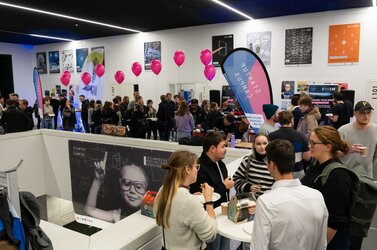
The evening lecture hall was packed with well over 100 participants from start-ups, students, political representatives and regional companies, delicious cappucino beforehand and pizza for everyone at the end. In between, a firework of great ideas from young founders. The 7th Start-up Day of the Startup Campus of the Deggendorf Institute of Technology (DIT), ITC1 Deggendorf and the Hans Lindner Foundation, which took place on 16 November on the DIT campus, was as successful as one could wish for. An evening you won't forget in a while.
Framed by a keynote speech by the well-known Munich start-up "happybrush" and a small panel discussion with the local heroes from "TI4F", a total of six start-ups pitched and battled each other for the favour of the curious audience. All business ideas had to be explained in a maximum of three minutes. Not so easy, given the sometimes complex and offbeat topics. The many questions from the audience reflected not only the great interest, but also the powerful impression all the pitches had made.
The team "wherehouse" presented a mobile phone app that even small companies can use to get a quick overview of their stock of C-parts, i.e. small things like screws or dowels, with just a few clicks. "Plant my Trip" then showed how artificial intelligence (AI) can be used to optimise the routes to and from the workplace as well as reduce costs for the workforce and cut CO2 emissions. Things were a bit bigger at "SHT", which is already very successfully working on a harvesting machine for commercial hemp. This project also showed what options the rural area offers and what would be difficult to develop in an urban environment. "Career Captain", the eventual winners of this challenge at the Start-up Day, explained their digital replica of workplaces so that interested people can get an exact image of what to expect in their future job while they are still applying. The sorting of Lego parts is taken care of by "reBricker". And who doesn't know the vast quantities of individual Lego parts from numerous construction kits lying around in the cellar or attic. The AI-based sorting machine from "reBricker" recognises each individual part and sorts them back into their original sets at the end. And of course, the topic of gaming was not to be missed. Here, "5 Finger Games" was at the start, which is developing a blockchain-based tactics game called "Knights of Cathena".
In addition to great company ideas, the Start-up Day also showed the strength of the associated network in and around Deggendorf. In addition to the DIT Startup Campus, there is also the Gründerzentrum Digitalisierung Niederbayern (GZDN) in ITC1 Deggendorf and the Hans Lindner Foundation. Together with the university's start-up activities, some of which are already anchored in the degree programmes, they form an ideal environment for young people who want to turn their dream of owning their own company into reality. Here you can try things out and try yourself out in a protected space. Motto: Just do it!
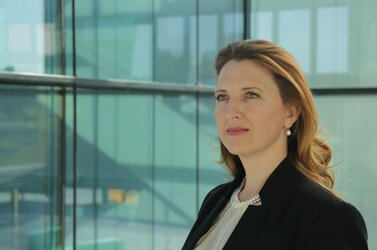
The UNICUM Foundation has announced this year's winners of the "Professor of the Year" competition. The Deggendorf Institute of Technology (DIT) is proud to announce that Prof. Dr. Helena Liebelt has won second place in the category "Engineering/Computer Science". Prof. Dr. Liebelt is head of the IT Centre and responsible for the HPC & Quantum Computing and Data Center Management degree programmes. First place went to Prof. Dr.-Ing. Dirk Sauer from Osnabrück University of Applied Sciences and third place to Prof. Dr. Jens Liebehenschel, Frankfurt University of Applied Sciences.
"Professor of the Year" honours professors who support their students in a special way in preparing them for their careers and who act as career pathfinders throughout Germany, it is not the lectures but the overall commitment of the candidate(s) that is honoured. The corona-induced closure of universities has created major barriers between teachers and studients, employers and career entrants. Consultation hours, internships, job fairs, exchange of experiences - all this could only take place virtually at best.
Liebelt has understood how to take on this pandemic as a special challenge and remain accessible to her students. Sven Kufner, 2nd executive of the Student Convention at the DIT, comments as follows: "Professor Liebelt supports us students in every way. In addition to practical presentations on current topics such as High Performance Computing, she regularly enlists personalities from business and research to introduce us to topics related to computer science from a wide variety of perspectives." The IT professor is also committed to the professional development of her students. For example, she arranges interesting internships with companies, provides support in choosing topics for Bachelor's theses and also goes above and beyond the call of duty to find employment after graduation.
"To belong to this circle is a really great honour for me," Liebelt explains enthusiastically. But this is also a distinction for the entire DIT, she adds. "At the university, no stone was left unturned in finding digital solutions for teaching during the crisis," the IT professor continues. The design framework was large, and the expertise and creativity of the professors had free rein. Now it is a matter of further combining, expanding and optimising the best of both worlds, analogue and digital.
Master's student Yaknan Gambo also appreciates his professor: "I have rarely met a teacher or manager who supports others professionally with so much fun and passion". In his view, Liebelt possesses the rare gift of bringing out the best in students and carrying them to success.
The award winners were chosen by an independent jury chaired by the former rector of the University of Duisburg-Essen, Prof. Dr. Ulrich Radtke.
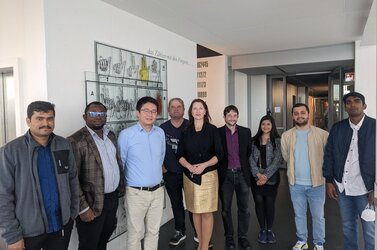
Quantum computing has only been part of the teaching portfolio of the Deggendorf Institute of Technology (DIT) since 2021. Nevertheless, in this short time, DIT has managed to bring its research onto the global stage. The current edition of the "Bavarian Quantum Computing eXchange" (BQCX) on 9 November was completely dedicated to innovative research at DIT.
"We are on a par with global players in the field of quantum computing," finds Prof. Dr. Helena Liebelt, the professor responsible for quantum computing at the university. The BQCX is a format of the Leibniz Computing Centre from the heart of Munich Quantum Valley. Once a month, there is an exchange between research and industry on progress in quantum computer sciences. This time, DIT professors Dr. Rui Li, Dr. Peter Faber and Dr. Helena Liebelt shared the stage with a number of young scientists from Deggendorf to talk about current results in Quantum AI, simulations and Quantum Fluid Dynamic. Those interested can find out more here: https://www.quantum.lrz.de/bqcx.
DIT was also represented with its results on the European stage at the end of October. Namely, at the international conference ACAT (Advanced Computing and Analysis Techniques in Physics Research) of the renowned CERN. In her keynote speech, Liebelt gave an overview of the path quantum technology has taken so far and where it stands today. In her presentation, she paid special attention to the development of young talent. "Training talent is exactly what we do at DIT," the Deggendorf IT expert explained enthusiastically. "Around half of the people currently still studying the Master's in High Performance Computing in Deggendorf have already been taken, and that's already a strong signal." DIT delegation's presentations have in turn led to new contacts and requests for further keynotes, also at international level.
Further international presentations by Professor Liebelt are planned for mid-November at the world's largest conference for high-performance computing, networking, storage and analysis, SC22 in Dallas (USA). All this shows "that research from the Bavarian Forest is taking a leading role, and that the Deggendorf programme for High Performance and Quantum Computing (HP/CP) is also attracting international attention," says Liebelt.
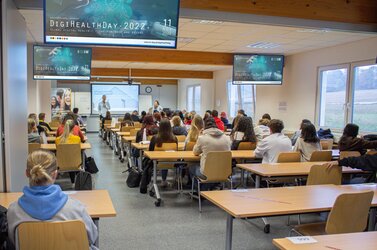
On 11 November, the DigiHealthDay (DHD) will take place for the third time at the European Campus Rottal-Inn (ECRI). The scientific symposium brings together internationally renowned experts, students and the interested public for one day to exchange ideas on the topic of digital health. Registrations for the free event are still possible.
This year, DHD-2022 is all about AI research, ethics and regulation in the field of Digital Health. The individual panels will look at these aspects from different angles. In the morning, keynote speeches will cover topics such as the modelling, development and implementation of transformed health ecosystems, digital health technologies or digital health innovations, including progress, setbacks and prospects. In parallel sessions, participants can then choose between a panel on the European Federation for Medical Informatics (EFMI), the student session or the scientific panel.
After the joint lunch break, the experts will address, among other things, the first WHO regional action plan for digital health in Europe, which will be presented by the WHO European Regional Office, in various keynote presentations. Other presentations will focus on the role of digital transformation in improving the performance of the health system or on health data as the key to future-oriented, data-based care. Finally, speakers from Canada, India, Norway, Austria and Germany will explore the question "DigiHealth-AI Quo Vadis: How to make AI safe, efficient, ethical, explainable and accountable?".
Participation in DHD-2022 is free of charge. It will not only take place on site at ECRI in Pfarrkirchen, but can also be attended virtually via Zoom. To participate on site, simply send an email with the subject "ONSITE" to info.digihealth@th-deg.de. Further information on the event and current updates can be found on the website www.th-deg.de/digihealthday.
DHD-2022 is supported by SHL Telemedicine as Premier Sponsor and iTD as Sponsor. Other partners of the event are the Bavarian State Ministry for Health and Care (StMGP), the Healthcare Information and Management Systems Society (HIMSS), the International Society for Telemedicine & eHealth (ISfTeH), the Consortium of Educational Institutions in Digital Health (CONEDIG), the International Medical Informatics Association (IMIA), the European Federation for Medical Informatics(EFMI), the Deutsche Gesellschaft für Digitale Medizin e. V. (DGDM), the German Society for Telemedicine e.V. (DGTelemed), the Bavarian TelemedAllianz. (BTA), the Armenian Association of Digital Health (AADH), the City of Pfarrkirchen, the Russian-Armenian University (RAU), the People's Friendship University of Russia (RUDN), the National Healthcare University of Ukraine (NHU), DigitalHealthNews. eu (media partner) and Munich Digital Health Summit (partner event).
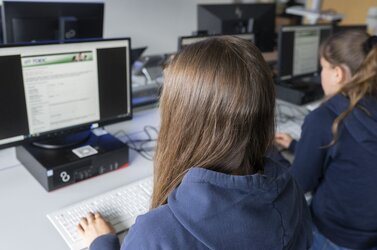
The TOEIC Listening & Reading Online covers the two competences listening comprehension and reading comprehension. DIT is offering the next examination date here on 9 December from 10 am, also for external candidates.
As a world language and language of commerce, English has become an indispensable part of working life. In many professions it has already become a requirement for employment. The number of English-language degree programmes on offer at home and abroad is also growing steadily in the wake of globalisation. So if you want to apply to an international employer or for an English-language degree course in the near future, you can benefit from the TOEIC (Test of English for International Communication). TOEIC is a globally recognised English certificate that is trusted by universities and large corporations to fairly and validly assess the job-related English skills of their applicants and employees.
The two-hour multiple-choice test is taken on the computer. All participants are accurately assigned to their personal language level based on their score and receive a result in every case - it is not possible to fail.
For the TOEIC Listening & Reading Test Online on 9 December, participation in the test date is obligatory. This will take place on 25 November at 1 pm. Registration is possible until 11 November at sprachenzentrum@th-deg.de. The examination fee is 130 euros (including the results report) or 150 euros (including the certificate).
More information at: www.th-deg.de/de/studierende/toeic
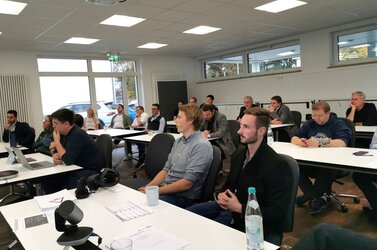
First "Meet the Teams" on 13 October in Oberschneiding. Prof. Peter Schmieder, founder and director of the Bavarian Innovation Transformation Centre (BITZ) took this opportunity to present the work of the Innovation Campus and to provide insights into the focus of the individual professors and mentors in this year's Silicon Valley Program (SVP). The invitation was extended by the board of the "ENGAGEMENT. PROMOTE. SUCCESS. UMSETZEN" (EF.EU).
The members of the association had the exclusive opportunity to meet the founders of the SVP at the Deggendorf Institute of Technology. Since the start of the programme in July, these so-called venture teams have been cooperating intensively with national and international mentors and Prof. Dr. Veronika Fetzer as instructor. The aim of the programme is to bring innovative products to market in such a way that they are attractive to investors and at the same time create regional jobs.
The venture teams presented their companies and products to the invited guests. In the evening, the three mentors Prof. Dr. Tobias Strobl, Dr. Ron Weissman and Geoff Baum were connected live to Silicon Valley during the SVP workshop. Mentor Dr Markus Ortmann was in Oberschneiding in person. There was an exclusive opportunity to experience the pitches of two founder teams. Including feedback from their mentors.
The chairman of the EF.EU Förderverein, Christian Schambeck, was enthusiastic: "I was already able to experience the results of the work in the SVP in Silicon Valley in April. Now we were able to see for ourselves once again how the teams develop their products in line with customer needs." In Schambeck's view, this is the only way to ensure sustainable success. Finally, the sponsoring association invited guests to enjoy pizza, beer and conversation. According to Prof. Peter Schmieder, precisely such networking opportunities are an essential building block for success. "I am glad that we receive such strong support with our EF.EU, especially from an entrepreneurial perspective. This takes our teams an extra step in the right direction."
The aim of EF.EU in this framework is to promote science and research as well as the active networking of companies, idea providers, supporters and professorships.
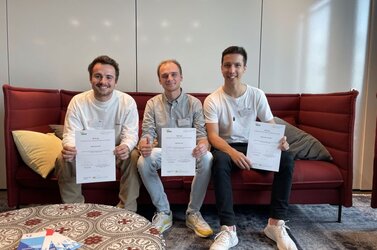
The startup "Career Captain" from Deggendorf has won a five-figure scholarship in a Bavarian-French competition in the field of artificial intelligence - up to 95,000 euros are earmarked for each of the eight best competitors. Now the founding team, which is supervised at the Deggendorf Institute of Technology (DIT), can pursue its start-up idea in the coming year. The Career Captain platform is intended to support young people in choosing a career by means of artificial intelligence (AI).
Above all, pupils should be able to find out their professional interests and get to know suitable companies via Career Captain. To do this, they have to take an orientation test that suggests suitable job profiles with the help of artificial intelligence. It is important to the founders that the platform is playful and appropriate for the target group.
The AI Cup, in which Maximilian Hau, Sebastian Hau and Maximilian Anzinger participated with Career Captain, is a Bavarian-French start-up initiative to support the next generation of AI entrepreneurs and bring forth innovative AI start-ups in Europe. This year, the University of Passau hosted the AI Cup. In the group of entrepreneurial competitors, the three founders took third place. The team started working on the platform two years ago. With the DIT Startup Campus as an advisory centre, they received an EXIST start-up grant, which expired in September. The funding from the AI Cup is important follow-on funding for the team.
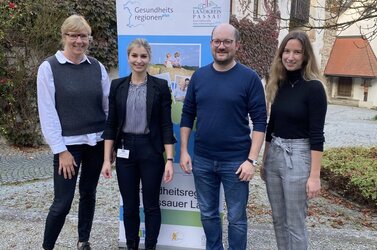
Excellent health care is an important topic in Germany. Among refugees and migrants, the topic of health prevention is not always as present as it should be. In order to promote health promotion and prevention among refugees and migrants in the future, the European Campus Rottal-Inn (ECRI) is cooperating with the Health Region Plus Passauer Land.
At the kick-off event with Prof. Dr. Thomas Spittler and Regina Escher from ECRI and Dr. Heidi Brandl, Head of the Department of Medical and Social Pedagogical Health Promotion at the Passau Health Department and the Head of the Health Region Plus Passau Land, Lisa Fraunhofer, the further roadmap of the cooperation was worked out. In line with the theme of the year, heart health, the focus is on promoting physical activity to prevent cardiovascular diseases such as heart attacks and improve heart health in general. To this end, three VHS courses in "easy language" are being launched as a pilot project in the Passau Land region.
ECRI is providing scientific support for the project. The focus is particularly on intercultural communication, which plays an important role in the work with refugees and migrants. ECRI is working on possible digitalisation strategies to make health topics even more target group-oriented and accessible in the future. The aim is to use this to make refugees and migrants aware of preventive measures in order to prevent cardiovascular diseases, for example. A key to this is the promotion of physical activity measures. The evaluation of the results from the pilot project is also on the agenda.
In the next step of the cooperation, those responsible at ECRI and the Gesundheitsregionplus Passauer Land want to set up a Stammtisch. This is planned for November and will involve regional actors to promote health promotion and prevention for refugees and migrants.
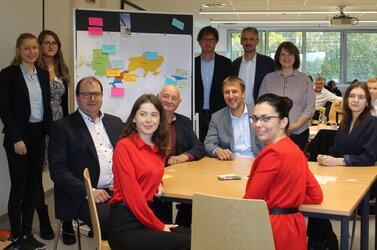
In the week from 10 to 14 October, the "Summer School Health Tour 2022" took place at the European Campus Rottal-Inn (ECRI) in Pfarrkirchen. This brought together students and lecturers from five partner universities to promote international initiatives in the areas of research and teaching in health tourism.
A total of 25 students and 10 lecturers from Georgia, the Czech Republic, Hungary, Croatia and Ukraine as well as the Secretary General of the European Spas Association (ESPA) in Brussels took part in the Summer School in Pfarrkirchen. During the week, everything revolved around health tourism and how research and teaching in this field can be linked on an international level. The Summer School had set itself the goal of bringing together training institutions, trainees and practical companies in the district of Rottal-Inn. In this way, training should be better oriented to the needs of the local health tourism businesses in the future. A discussion with representatives of numerous regional businesses took place in the middle of the week under the title "Science meets Industry". The participants were able to take away important ideas and make interesting contacts for future projects and recruitment. This format will continue beyond the Summer School.
In addition, the creation of ideas for future joint projects and events in health tourism for the district of Rottal-Inn was on the agenda. In order to get to know the region better, a health tourism excursion to the Naturium in Ering am Inn as well as to Bad Griesbach took place on Thursday, where the participants were given a guided tour of the spa and the guest services by Mr Altmannsberger and Mr Weinzierl. Afterwards, the group visited the Hotel Maximilan in Bad Griesbach. On this day, promising contacts were made between the students and the companies.
It is precisely the exchange with partners from business and industry and the cooperation on an international level during the Summer School that form the recipe for success for the transnational cooperation. Prof. Dr. Marcus Herntrei, head of the project, emphasised: "This first meeting of all partners from six countries was an inspiring exchange on the status quo in health tourism. We were able to deepen valuable contacts and agreed on very concrete next steps. Already in December 2022, we will continue with mutual working visits as well as the winter workshop of the lecturers. I am proud that the European Campus in Pfarrkirchen is the breeding ground for this great international project".
The "Summer School Health Tour 2022" was financially supported by the friends & associates of ECRI, the Rottal-Inn Economic Development Corporation and WEKO Pfarrkirchen. It was organised as part of the four-year project "Internationalisation in International Tourism Management / Health Tourism" and is funded by the German Academic Exchange Service (DAAD). The project at ECRI is led by Prof. Dr. Marcus Herntrei.
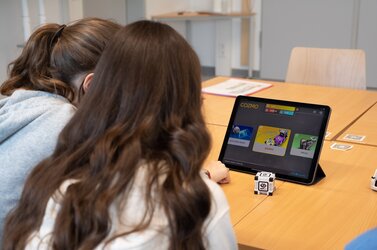
The European Campus Rottal-Inn (ECRI) is taking part in this year’s Europe-wide CodeWeek. Young people who are interested in programming will get their money’s worth on Thursday, 27 October.
Under the title “Programming with Cozmo”, ECRI is offering a programme for young people between the age of 12 and 15. Participants will learn to programme the robot Cozmo with the programming language Scratch. No special previous knowledge is required. What is important is to have fun and be interested in programming, hacking and inventing. The young people will learn everything else from Dimitrios Athanasopoulos, lab engineer and Cozmo expert at ECRI.
Since the event is offered in English, language knowledge is required. German-language support will be provided in the terms of being able to ask questions in German. The event will take place on 27 October from 3 to 4.30 pm in the DigiHealth & Smart Tourism Lab in the SILC Building at ECRI in Pfarrkirchen. As the number of participants is limited to 10, prior registration is requested by sending an e-mail to Andrea Ebertseder (andrea.ebertseder@th-deg.de).
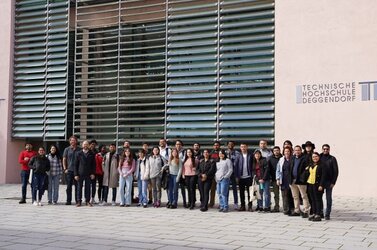
Fifteen students from the Universidad de Concepión Chile (UDEC) visited the Deggendorf Institute of Technology (DIT) for a week at the end of September. Together with DIT students from the field of energy management, they took part in the GROW4Energy Startup Summer School. The focus was on developing joint ideas and exchanging knowledge in topics such as solar, wind and hydro energy, energy from biomass and e-mobility. In addition, a long term cooperation between the UDEC and DIT was to be established and the entrepreneurial spirit in the respective regions strengthened.
In the GROW4Energy Startup Summer School, the students listened to lectures on topics in the fields of entrepreneurship, energy economics and intercultural communication and participated in workshops focusing on the development of startups and ideas. There were also panel discussions, a pitch event and excursions to regional energy companies. The GROW4Energy Startup Summer School was organised and conducted by Prof. Dr. Javier Valdes, expert in BigGeoData, and Prof. Dr. Thomas Geiß, head of the DIT Startup Campus.
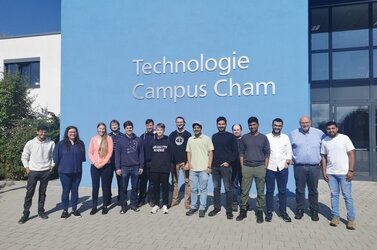
With the conclusion of the third summer school at Campus Cham, the Interreg/ETZ-funded cooperation project “Summer with Industry 4.0” of the Deggendorf Institute of Technology (DIT) and the University of West Bohemia in Pilsen came to a successful end. The two project partners were funded with a total of 130,000 euros.
A total of around 30 students from Cham and Pilsen took part in the three events, which were held both at Campus Cham and at the university in Pilsen. The range of topics, which was under the overall motto “Industry 4.0 – Digitalisation of Industrial Processes”, included “Predicitive Maintenance”, “Machine Learning”, “Virtual Commissioning”, “Digital Twins” and “Autonomous and Collaborative Robots”. As can be seen from the names of the topics, the events were held entirely in English. According to Prof. Dr.-Ing. Peter Firsching from Campus Cham, this was the opportunity given to international students for professional exchange, but also for gaining experience in activities with cross-border cooperation.”
Another important aspect, besides the teaching of professional knowledge, was the social interaction of the different nations (Czech Republic, Germany, India and Ukraine). Intercultural cooperation plays and increasingly important role in many high-text projects today. Therefore, this project also focused on the cooperation of international teams of experts.

At the start of the semester in early October, the European Campus Rottal-Inn (ECRI) in Pfarrkirchen gets very busy. This is also noticeable on the housing market in Pfarrkirchen and the surrounding area, as many students are looking for a suitable place to stay. To support both, those looking for accommodation and landlords, the university offers a housing exchange.
“The demand for flats is particularly high at the moment,” says Daniela Schwertlinger, a member from the International Office at ECRI and responsible for housing support. “To ensure that as many students as possible have a place to live at the start of the semester, we rely on the public’s help.” Schwertlinger asks landlords in Pfarrkirchen and the surrounding area to publish their offers on the university’s housing exchange. Free rooms in existing shared flats can also be offered here.
The university’s internal housing exchange went online in the winter semester 2016/2017. Creating an offer in the housing exchange is easy and takes less than ten minutes. The selected furniture/applications are translated automatically into English. Photos can also be attached to make the offer visually appealing. The International Office is happy to support landlords, for example if they want to create an English-language tenancy agreement.
The housing exchange can be viewed at www.th-deg.de/wb. If you have any questions about the housing programme, Daniela Schwertlinger is available as contact person (daniela.schwertlinger@th-deg.de or via phone +49 991 3615 8843).
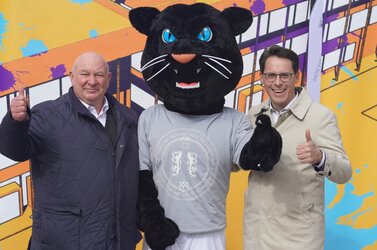
The campus of the Deggendorf Institute of Technology (DIT) was buzzing with people: On Thuesday, 4 October, around 2,200 students began their studies in Deggendorf and at the campuses in Cham and Pfarrkirchen. Officials of the university, the city and the student institutions warmly welcomed the newcomers.
Deggendorf’s Mayor Dr. Christian Moser started the Freshers’ day. He warmly welcomed all students to the city of Deggendorf and focused on anticipation: The Christmas market in Deggendorf will take place this year. The prospect of mulled wine and biscuits made those present very happy in view of the initially chilly temperatures. Prof. Waldemar Berg, Vice President of DIT, encouraged the prospective students to take their studies seriously and to take advantage of the opportunities and potential at DIT. At the same time, he said, studying is a formative time in personal and social terms. Leisure time and friends are just as important a part of this period of life as learning. In Deggendorf, a city with a distinctive nightlife and an extremely attractive surrounding area, the best conditions exist for all of this. Afterwards, representatives of the various higher education institutions, the student union and the university’s church congregations welcomed the newcomers to Deggendorf in both German and English. This has long been a common and necessary procedure at the Deggendorf Institute of Technology, as DIT’s strategy continues to bear fruit. With 41 percent international students from 123 countries, the Deggendorf Institute of Technology is one of the most international universities in Bavaria. The university is still growing. Around 2,200 students will begin their degrees at DIT in the winter semester. According to Dr. Jörg Kunz, the numers will still increase, as there are still a number of open enrolments that will be counted once complete. A total of 8,500 students are currently studying at the campus in Deggendorf and at the teaching locations in Pfarrkirchen and Cham.
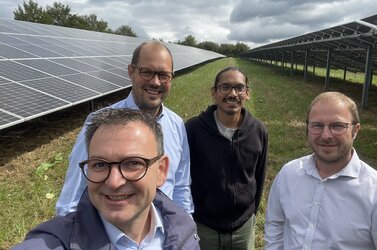
Against the backdrop of the energy crisis, renewable energies are to be increasingly used in the future. Once central technology is photovoltaics (PV), which generates electricity from the sun’s rays. As part of a Master’s thesis, the European Campus Rottal-Inn (ECRI) is looking at how solar energy can be used even more efficiently in the future.
There are already several PV parks in the district of Rottal-Inn. The plant in Gangkofen is equipped with innovative bifacial modules. These are special because they also produce electricity via the rear side and are even more efficient than conventional modules. In his Master’s thesis, ECRI student Irineu Auccappure, supervised by Prof. Dr.-Ing. Matthias Huber, is investigating the extent to which the use of radiation on the back of bifacial modules increases the use. For that he is examining factors such as the installation and orientation of the modules in the Gangkofen PV park.
Since realistic measurement and evaluation is not possible in the laboratory, Irineu Auccappure carried out the practical part of his Master’s thesis on site at the PV park. In an experiment, he covered the backs of selected modules with cardboard supported by wooden sticks and compared the energy production. The data collected in this way can be used to find out how the bifacial modules are set up and aligned to make the best use of the solar energy. One hundred percent of the materials used for the project are recycled materials.
Sustainability is the main theme for the operators of the PV plant. Thus, the park with a total output of 4,500 kWp not only produces electricity for an average of about 2,500 households, but was also planned and built according to the latest standards by sunbird energy GmbH. In the spirit of sustainability, the management of the PV park, FinRo®, always tries to leave a strip of green per row during each mowing so that there is enough food for the insects.
During the visit to the PV park, Prof. Huber from ECRI, Jan Kiermeier, Managing Director of sunbird energy GmbH and Harald Eder from FinRo® agreed to continue and expand the cooperation between the campus and the operators of the plant.
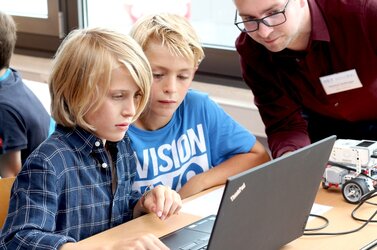
Tinkering, hacking, programming: From 8 to 23 October, events on the topic of digitalisation will be taking place across Europe. Companies and institutions are opening their doors and inviting people to take part in a wide variety of hands-on activities. This includes the Deggendorf Institute of Technology (DIT), which, together with MINT-Labs Regensburg e.V., has brought CodeWeek to Bavaria as a regional hub.
It starts in Deggendorf on 11 October. For the university’s STEM team and Vice President Prof. Waldemar Berg, there will be two reasons to celebrate on this day: At the same time as the starting signal for CodeWeek at DIT, those responsible will also open the new student laboratory at the Deggendorf Institute of Technology. This gives the STEM team and all other DIT stakeholders even better opportunities to welcome and supervise student groups at the university. The school lab, the only one of its kind between Passau and Regensburg, will be in full use during CodeWeek. In the mornings, school groups have booked an exciting schedule of programming, screwing and soldering in the various laboratories and faculties at DIT. From 11 to 13 October, in the afternoons from 2 to 4 pm, the doors of the new student lab will be open to anyone interested. Drop in and join in thi motto, registration is not necessary. During this time, various circuit boards and robots can be programmed using the openrobertalab platform. Members of the STEM team and student tutors are in charge of the lab and are available for help and advice. The lab is located in room G.205, all curious people from the age of eight and young adults are welcome.
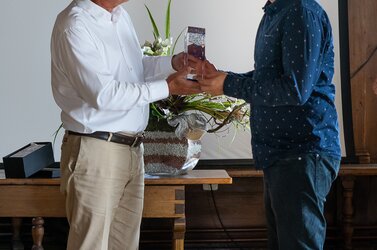
The "Anton Fink Science Prize for Artificial Intelligence (AI)", which was awarded for the first time this year by the Deggendorf Institute of Technology (DIT), will go into the second round in 2023. Individuals, start-ups, universities, research institutes, foundations or even companies can win. The prerequisites are ground-breaking achievements in the research, development or practical applications of artificial intelligence. 10,000 euros will be awarded as the main prize, as well as the young talent award for final theses with 1,000 euros.
"Competitive mechanical engineering and modern services are at the core of our prosperity," says pharmacist Anton Fink, explaining his personal motivation to offer this prize again. In addition, the topic of medicine is particularly close to his heart. "That is why the current call for entries also includes AI applications in the field of medicine," as Fink explains. The prize is intended to honour and promote corresponding digital innovations.
Applications with projects, research results or teaching offers are accepted from Germany, Austria and the Czech Republic. The deadline for applications is 31 January 2023. Applications must include information on the projects, research results or teaching offers, a sketch of the innovation created by them and a curriculum vitae of the applicant.
Individuals aged 18 and older who are resident in the countries mentioned are eligible to apply. But also groups or companies that have their headquarters there. However, these must designate a natural person to make the application and take responsibility for it. Submissions are accepted in both German and English.
Prof. Dr. Patrick Glauner, who is mainly responsible for supervising the science award on the DIT side, is pleased with the AI innovations that won prizes this year: "Prof. Dr. Jan Schmitt from the University of Applied Sciences Würzburg-Schweinfurt had convinced us with his many years of work on the production-related use of flexible and precise robots". In addition, the young talent award went to Sarah Riedmann and Jonas Harb from the Salzburg University of Applied Sciences. In their double master's thesis, both had implemented an innovative guidance control system for production systems with the help of "Deep Reinforcement Learning".
The award ceremony is scheduled for 11 May 2023 in Deggendorf. The jury includes the former Bavarian Minister of Science Bernd Sibler and the founder, pharmacist Anton Fink himself.
Details on the call for entries are available at www.th-deg.de/ai-prize.
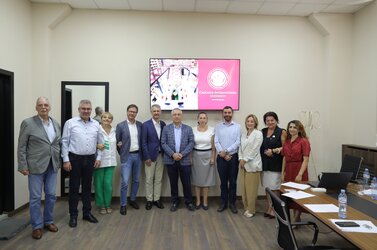
The European Campus Rottal-Inn (ECRI) of the Deggendorf Institute of Technology (DIT) launched the Health Tour project at the beginning of the year, which is dedicated to the internationalisation of research and teaching in the field of health tourism. In order to advance this project and establish a new cooperation, a delegation from Pfarrkirchen visited the Caucasus International University (CIU) in Tbilisi, Georgia.
The focus of the visit was on getting to know each other, networking and exploring future cooperation possibilities in line with DIT's focus in research and teaching. The ECRI delegation consisting of Dean Prof. Georg Christian Steckenbauer, Prof. Dr. Marcus Herntrei, Dr. Guido Kaufmann and Dr. Viachaslau Nikitsin was welcomed by Vakhtang Tsivtsivadze, the founder of CIU, Kakhaber Kordzaia, the Rector of CIU and the Dean of the CIU School of Business, Giorgi Abashishvili. In short presentations, ECRI introduced itself with its Health Tour project and CIU gave an overview of its institution. Prof. Steckenbauer and Prof. Herntrei each gave a lecture on health tourism topics for the academic staff of CIU.
As part of the Health Tour project, a Summer School will be held in Pfarrkirchen from 10 to 14 October, which will also be attended by representatives of the CIU. The project is led by Prof. Dr. Marcus Herntrei from ECRI and brings together partners from the Czech Republic, Hungary, Ukraine, Belgium, Croatia and soon Georgia. Important components of the project are meetings and exchanges on an international level, such as at the Summer School taking place in October, or through mobility of teaching staff and students between the partners.
The Health Tour project will be implemented during the period from January 2022 to December 2025 and is funded by the German Academic Exchange Service (DAAD) through the HAW.International programme.
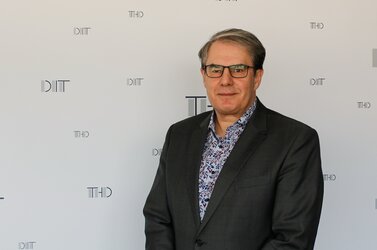
With the open lectures for adults, the European Campus Rottal-Inn (ECRI) offers a format for education-hungry adults. The next lecture in the series will take place on 22 September at 5 pm. The topic this time is: Climate protection concerns us all – the ecological footprint.
There is talk everywhere that humans are destroying planet earth. With the way we manage, consume and empower ourselves. In fact, there is probably little that can be done about it. But does this image help us when it comes to stopping climate change? Prof. Josef Steretzeder explores this question in an interactive workshop at the open lectures for adults. Together with the participants, he will determine their personal ecological footprint, explain why less waste alone is not the solution and how a positive image of humanity can help us in climate protection.
The open lectures for adults is open to anyone interested, regardless of prior education. The lecture on climate protection will take place at the Sustainability and Innovation Lab Centre (SILC) at the campus in Max-Breiherr-Straße in Pfarrkirchen. Prior registration is not necessary.
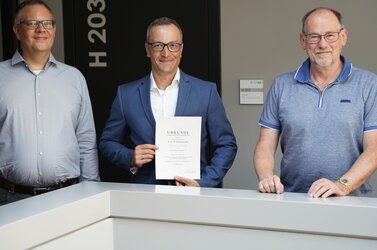
On 1 September, another professorship was successfully filled in the Faculty of Applied Computer Science at the Deggendorf Institute of Technology (DIT). Prof. Dr. Thomas Buchmann, an expert in software engineering and model-driven software development, joins the growing faculty at DIT with immediate effect.
The IT specialist looks back on a successful academic career at the University of Bayreuth. His diploma in mathematics in 2002 was later followed by a doctorate (2010) and habilitation (2017), both in computer science. "After that, I taught and researched for five years as an academic councillor at Bayreuth University," Buchmann reports. But the 45-year-old native of the Upper Palatinate also brings practical business experience with him to Deggendorf. Between his studies and his doctorate, Buchmann worked for Desko GmbH, a developer of hardware for reading documents such as ID cards, barcodes, magnetic strips and chip cards. There he headed the software development department for three years. Prof. Buchmann, who describes himself as "calm, level-headed, but also determined", finds the development dynamics at DIT particularly interesting. "The growth that the Deggendorf Institute of Technology has to show," says the software expert, "is quite impressive." This has excited him and he would like to be on board in order for him to bring his own extensive experience to research and contribute to teaching.
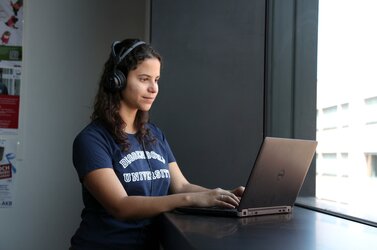
In September, preparatory courses for first-year students will begin at the Deggendorf Institute of Technology (DIT). First-semester students can refresh their knowledge in basic subjects with this course offer. Registration is still possible.
The preparatory courses are offered in subjects such as accounting, mathematics, physics or computer science. The course "Studying with Success" provides prospective students with practical tips on how to organise their daily study routine, how to prepare for exams on an ongoing basis and how to work scientifically. The complete range of courses can be viewed on the internet at www.th-deg.de/en/study-with-us/prep-courses. Students can also register directly online. Questions about the courses can be answered by the Career Service via e-mail at vorbereitungs-kurse@th-deg.de or by phone at +49 991 3615 223.
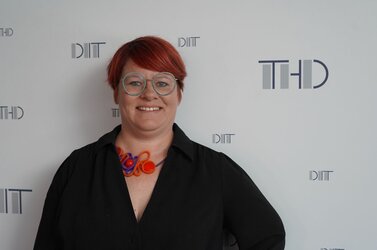
The Deggendorf Institute of Technology (DIT) has been able to attract a first-class appointment for the professorship of "Global Public Health". Dr. Sabine Dittrich has held the position at the European Campus Rottal-Inn (ECRI) in Pfarrkirchen since 1 August. Her students in the Master's programme Global Public Health can look forward to a lecturer with worldwide experience in public health.
Colourful and curious - that is simply Prof. Dr. Sabine Dittrich's motto. "From my red hair to my stories from all over the world - colourful, curious, yet determined and assertive. That probably describes me best," Dittrich says about herself. Her curiosity and hard work have taken as far as Singapore, England, the Netherlands, Laos and Switzerland. After almost 20 years abroad, the native of Augsburg is now returning to Bavaria. In her luggage: a lot of experience in terms of health care and research. Her area of expertise relates to how pathogens are detected, diagnosed and communicated in the health system. Her work in Laos and Geneva had the greatest impact on the microbiologist. In Asia, she researched and practised at the country's largest state hospital; in Geneva, she sat as an expert at the round table to help make global health decisions. She knows the systems inside and out. Sabine Dittrich has worked with the world's top infectious disease researchers, held positions at the EU and the Tropical Institute in Berlin, and maintains close ties with the University of Oxford. She now wants to bring her expertise, experience and networks to DIT. "I am looking forward to meeting the students and working with them on how to build better health systems. It will be great to educate this next generation to ensure that all people around the world have access to good healthcare including new technologies," says the newly appointed professor. At DIT, the combination of international orientation and a pragmatic and innovative environment appeal to her. Her students can expect practical examples and interactions with colleagues in international organisations as well as many discussions from her. After all, Dr Sabine Dittrich knows that only those who are open to new opinions and data can follow scientifically sound paths. Until the students return to the university in early October, the new professor and her dog are busy settling in and getting used to the local dialect.
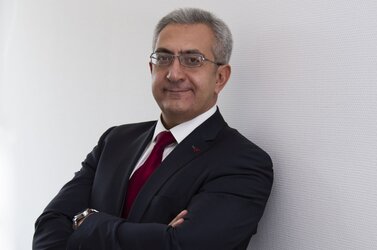
On 11 November the DigiHealthDay (DHD) will take place for the third time. The international scientific symposium will be preceeded by two more workshops and an Erasmus+ blended intensive programme on artificial intelligence in healthcare. Registration to all events of the DHD22 series is still open. In addition, the submission deadline for scientific papers will be extended until 1 October.
The European Campus Rottal-Inn (ECRI) of the Deggendorf Institute of Technology (DIT) hosts the DHD for the third time, this year as a hybrid event (on-site and live stream). In the run up to the main event on 11 November, there will be two more workshops in October on relevant topics of Digital Health. Participation in the virtual workshops is free and registration is open on the official website: www.th-deg.de/digihealthday
Preceeding the main event, there will be an Erasmus+ blended intensive programme from 7 to 11 November. The programme titled “Explainable and Ethical AI in Healthcare” is funded by the European Union under the Erasmus+ programme and will be hosted by DIT-ECRI, University of Agder (Norway), Aalborg University (Denmark) and Luleå Technical University (Sweden). People interested in participating in the programme can register by sending an e-mail to info.digihealth@th-deg.de, including name, affiliation / position, and study programmes (for students) until 1 October.
Researchers and scientific staff can also contribute to the DHD22 by submitting scientific papers in the field of Digital Health to the committee. Scientific contributions will be published jointly in DIT’s Journal of Applied Interdisciplinary Research (JAIR) and the Ukrainian Journal of Medical Informatics and Engineering, to support the Ukrainian colleagues in the field of Digital Health research. In addition to that there is an extraordinary chance for students to win a cash price for their R&D project, including the thesis work on Digital Health topics. The deadline for both submissions, the scientific papers and the student projects, will be extended until 1 October. Information on submissions and criteria can be found on the official website: www.th-deg.de/digihealthday
The main DHD22 event on 11 November includes plenaries, scientific and student sessions, a special EFMI Session, and a panel discussion. The international scientific symposium features Prof. Dipak Kalra (UK), Prof. Bernd Blobel (Germany), Prof. Rajendra Gupta (India), Prof. Sarah Wamala Andersson (Sweden), Prof. Louise Pape-Haugaard (Denmark), Prof. Martin Gerdes (Norway) and other world-renowned speakers.
The DHD22 series is hosted by DIT-ECRI in cooperation with its sponsors and partners: Bavarian State Ministry of Health and Care (Stmgp), Healthcare Information and Management Systems Society (HIMSS), International Society for Telemedicine & eHealth (ISfTeH), International Medical Informatics Association (IMIA), European Federation for Medical Informatics (EFMI), German Society of Digital Medicine e.V. (DGDM), German Telemedicine Society (DGTelemed), Bavarian Telemedinice Alliance (BTA), Armenian Association of Digital Health (AADH), City of Pfarrkirchen, Russian-Armenian University (RAU), People's Friendship University of Russia (RUDN), National Healthcare University of Ukraine (NHU), and DigitalHealthNews.eu (the media partner).
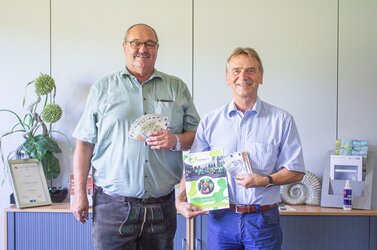
At the European Campus Rottal-Inn (ECRI) summer fest in July, various cakes were sold at the international bake sale. The proceeds from the cake sale have now been donated to the Kinderkrebshilfe Rottal-Inn e.V. (Children’s Cancer Aid).
It is a tradition that cakes are sold for a good cause at the ECRI summer fest and the proceedings are donated to a charity. This year, the cake sale raised a total of € 385. Campus Director Prof. Dr. Horst Kunhardt added the remaining difference to €500 from his own pocket, which were donated to the Kinderkrebshilfe Rottal-Inn e.V..
For Josef Hofbauer, the 1st chairman of the Kinderkrebshilfe Rottal-Inn e.V., the donation is an important signal and enabled the association to support children with cancer and services that are not covered by health insurance. In addition, donations can also help many families who are in financial need due to the disease, for example, when the salary is not enough or the parents have to stop working to be able to care for their child. Every donation, no matter how large or small, is needed and goes directly to where it is needed. Hofbauer emphasised during his visit to the campus. He also exchanged views with Prof. Kunhardt on the palliative and hospice situation in the Rottal and the surrounding districts of Passau and Deggendorf. The lack of palliative care and assistance in the region makes the work of the Kinderkrebshilfe Rottal-Inn e.V. all the more necessary.
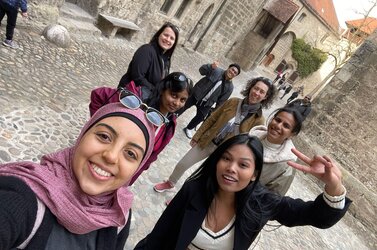
At the European Campus Rottal-Inn (ECRI), numerous young people will once again begin their studies in October. Many of them come from a different country and cultural background. In order to promote cultural exchange and to bring students closer to the Bavarian culture, ECRI is once again offering the Host Family Programme this semester. Interested students can register now.
The Host Family Programme enables international students to make contacts off campus and to get to know the Bavarian culture and way of life. For this purpose, the university establishes contact between students and locals, who then meet informally and as often as they like. Whether it’s coffee and cake, a trip to the beer garden, a games evening or cooking together. There are many opportunities to introduce students to the area and culture.
Participants in the Host Family Programme don’t need to be afraid of possible language barriers. Most students know German very well and are happy to use their language skills in conversation with locals. For locals, too, the Host Family Programme offers the perfect opportunity to speak English casually and thus deepen their language vocabulary. In addition, they get to know the respective country of the students, its inhabitants and their culture. Last but not least, friendships are also made and togetherness is enriched. A small insight into the programme is provided by the university’s podcast, in which participants share their experiences so far. You can find the podcast at: https://www.th-deg.de/campustalk.
Further information and the application form for the Host Family Programme can be found on the website at www.th-deg.de/hostfamily. If you have any questions, please contact Andrea Ebertseder via e-mail at andrea.ebertseder@th-deg.de or give her call on +49 991 3615 8863.
The Host Family Programme is a non-profit organisation of the Deggendorf Institute of Technology, which is dedicated to the integration of foreign students. At ECRI in Pfarrkirchen, the programme started for the first time in the winter semester 2019/2020 with six host familied and ten students.
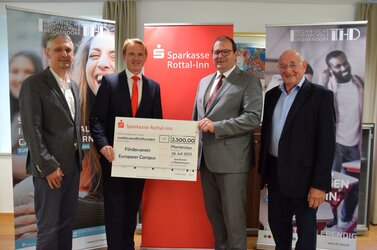
The European Campus Rottal-Inn (ECRI) is pleased to announce a donation from the District Association of the Lower Bavarian Sparkassen to the ECRI Support Association. The cheque for € 2,500 will directly benefit the students, who will have access to a drinking water dispenser from October.
Martin Ruhland, Chairman of the Board of Sparkasse Rottal-Inn, presented the cheque from the District Association of the Lower Bavarian Sparkassen. Dean Prof. Dr. Georg Christian Steckenbauer and university coordinator Georg Riedl were also present when the cheque was handed over to Michael Fahmüller, the first chairman of the ECRI support association.
The money from the donation will go towards a water dispenser on campus, from which students will benefit from the coming semester. The water dispenser not only supplies fresh drinking water, but also counts how many plastic bottles are saved by students refilling their bottles. The project not only demonstrates how important it is to take care of water resources, but also how good the water quality is in Germany. For many students, drinkable water from the tap is so unimaginable that they resort to water from plastic bottles. With a project on drinking water, the university wants to sensitise students to the issue. For example, signs saying "Drinking Water" have already been placed on the taps in the university. Thanks to the donation from the District Association of Lower Bavarian Savings Banks, this project can be expanded to include a water dispenser and the built-in meter will make the extent to which this is done for the environment clear, thus contributing to sustainability.
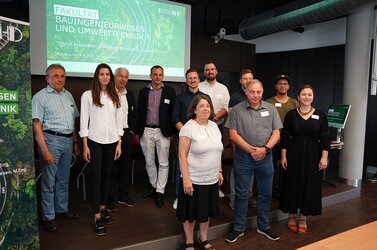
An event was recently held at the Deggendorf Institute of Technology (DIT) campus for company representatives and researchers to learn about advances in drone and software technology in the field of digital inspection of buildings and infrastructures. With over 120 participants and positive feedback throughout, the event was a great success.
Under the title “Digital Inspection: Buildings, Structures, Drones & more”, the modern and complex topic of “digital inspection in construction” was extensively examined from several sides. After a welcome by the university management, represented by Prof. Dr. Horst Kunhardt, experts from STRUCINSPECT (a subsidiary of the world market leader and manufacturer of innovative cranes PALFINGER) reported on the possibilities of digital building inspection in the context of building data modelling, or BIM for short, drones and software. With the help of a practical example of a motorway subway, the speakers impressively demonstrated how digital inspection can be carried out in practice today.
Afterwards, Louisa Harmann, Customer Success Expert of the Munich-based company Fairfleet GmbH, spoke about challenges and solutions of buildings and roof inspection from the air and presented many practical examples and applications of drone technology.
This was followed by a panel discussion in which, in addition to the speakers from the two keynote presentations, the founders of the Deggendorf-based start-up “Squadron”, which was founded by DIT students at the European Campus Rottal-Inn (ECRI) in Pfarrkirchen, also had their say. Everyone agreed that technological progress can make the processes of recording, documenting and eliminating defects many times faster and easier. Finally, there was an opportunity for informal exchange for guests and speakers present.
The number of 120 participants at the event shows the great interest of the industry in the topic. The initiative for the event came from Hubert Girschitzka, Business Development Partner of STRUCINSPECT in Bavaria and Pfarrkirchen’s former mayor Georg Riedl.
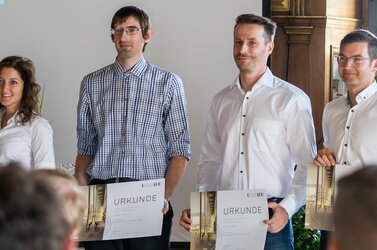
They are not only the first in Deggendorf, but in all of Germany: In a ceremony in the city’s Old Town Hall, the Deggendorf Institute of Technology (DIT) said goodbye to the graduates of the Bachelor’s programme in Artificial Intelligence at the end of June. Seven former students were delighted to receive their certificates from the hands of programme coordinator Prof. Dr. Heribert Popp and AI professor Dr. Patrick Glauner.
A special video message came from Germany’s largest institute for artificial intelligence (DFKI). Managing Director Prof. Dr. Antonio Krüger did not miss the opportunity to send special greetings to Deggendorf on the occasion of the first Bachelor AI graduates in Germany. He appealed: Be aware of your ethical responsibility and put people at the centre of your AI projects. Krüger emphasised the key role of artificial intelligence for the future and praised the Deggendorf Institute of Technology for recognising this faster than other universities and consequently being able to say goodbye to the first graduates. The initiator and coordinator of the programme, Prof. Dr. Dr. Heribert Popp, congratulated his former students. He pointed out that with this certificate they had bright prospects not only in Germany and Europe. With a degree from DIT, one of the most successful university start-ups in Bavaria with enormous growth, an above-average international share and internationally successful rankings, they would not have to hide in the USA either, said Popp.
Artificial Intelligence has been booming for several years, skilled workers are in short supply, and the federal and state governments are trying to promote the topic with considerable funds. The Deggendorf Institute of Technology reacted quickly and has been offering the Bachelor’s programme in Artificial Intelligence since 2019. At the start of the new degree programme, already trained computer scientists from the various disciplines were also admitted. They were able to have the common modules from their computer science studies credited to them. In addition, all students were already working in IT professions, and the necessary practical semester was also omitted. Thus, in October 2021, the first students were able to successfully complete their Bachelor’s degree in Artificial Intelligence at DIT after only two years of study and while working.
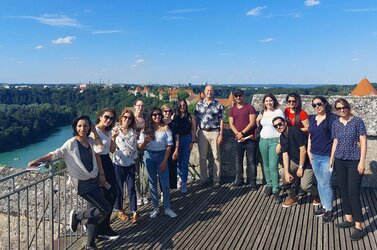
On 15 July, students from the Healthy and Sustainable Buildings course at the European Campus Rottal-Inn (ECRI) went on an excursion together with course director Prof. Dr. Michael Laar. They visited the company Schlagman Poroton and the town of Burghausen.
The group started at the Schlagman Poroton company in Zeilarn. The students learned about various building materials, including the world's best pure mineral highly insulating brick. The know-how and the range of products, as well as the ultra-modern production facilities, were therefore particularly interesting for the students at Schlagman Poroton. The company then invited the students to lunch together in Marktl.
Afterwards, the group went on to Burghausen. They immersed themselves in medieval architecture at the longest castle in the world. In addition to the buildings of the castle, the students also visited the museum with Renaissance paintings of the Bavarian State Gallery. They discussed, among other things, the development of perspectives in paintings since the Renaissance until today.
Urban planning also plays a major role for the students of the Healthy and Sustainable Buildings programme. Therefore, the group explored the historic city centre and the Grüben as an example of a well achieved balance between preservation of the historic substance and modern use at the same time. The adjacent Wöhrsee as an inner-city and sustainable leisure option was also on the agenda. During the excursion, the international students were not only interested in the technical topics. They also absorbed the information about the development of Bavarian culture. The knowledge about the historical development as well as the modern and innovative building materials form an important basis for the students' future work in Bavarian and German companies.
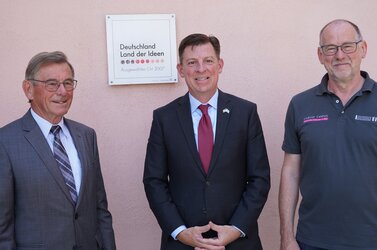
On 20 July, US Consul General Timothy E. Liston, in the presence of former Member of the German Parliament Bartholomäus Kalb, made a brief detour to the Deggendorf University of Applied Sciences as part of a visit to the Deggendorf district. Prof. Dr. Peter Sperber, President of the Deggendorf Institute of Technology (DIT), reported to his guests on the current connections of DIT to the United States.
The Consul General was particularly impressed by the university's Silicon Valley Program and the intensive cooperation between DIT and the Santa Clara University in California. "A showcase project in terms of spin-offs and especially in the effort to transform innovations into marketable products and companies," as Prof. Sperber emphasised. The Consul General was naturally pleased to hear that the American start-up spirit and contact with successful US companies could also give start-ups in Lower Bavaria a tailwind.
According to Sperber, there is still room for improvement in the number of students coming to Deggendorf from the USA. But the university is very active in this area and tries, among other things, "to attract young people to us with study programmes that are very close to the social challenges of our time", says Sperber. Thematically, this ranges from health to digitalisation. In the opposite direction, DIT's International Office will be able to arrange semesters abroad in the United States for about ten students this academic year. Unfortunately, the Covid effects are still being felt to some extent, especially in overseas exchanges. This has (still) resulted in a lower number of students studying abroad than in previous years.
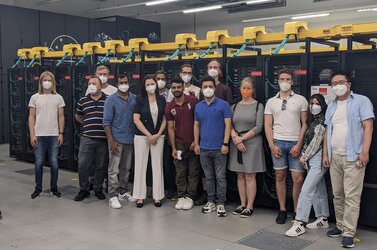
Two of the currently fastest supercomputers in Germany are located in computing centres near Munich. The Leibniz Supercomputing Centre (LRZ) and the Max Planck Society are responsible for the high-performance computers. They have now given students from the Deggendorf Institute of Technology (DIT) a rare look behind the scenes.
During the excursion to Garching, the students of the Master's degree programme High-Performance Computing/Quantum Computing were able to take a close look at the supercomputers of both computing centres. "SuperMuc-NG" and "Raven&Raven" are ranked 2nd and 5th respectively among the fastest supercomputers in Germany. "SuperMuc-NG" of the Leibniz Supercomputing Centre is even listed as the 26th fastest computer worldwide.
From the scientists of the Leibniz Supercomputing Centre and the Max Planck Society, the students learned more about the infrastructure and operation of these high-performance computing centres - from hardware to software to security measures to research and services performed. According to Prof. Dr. Rui Li and Prof. Dr. Peter Faber, the first look inside the supercomputer "SuperMuc-NG" was impressive. The group was also particularly interested in the energy and cooling system. Especially with regard to the topic of sustainability. The hosts answered questions in detail. The group of visitors was surprised that even groundwater from the Isar wetlands is used to cool the computer centres.
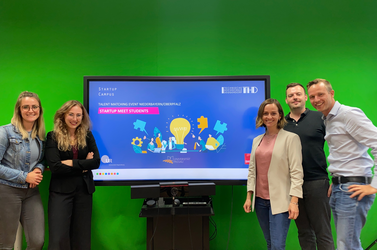
Even though it is probably assumed otherwise, it is often difficult for university start-ups to find fellow entrepreneurs to build up their business. Start-up advisors from the universities and colleges from the Deggendorf Institute of Technology, Passau, Landshut, Regensburg and Amberg-Weiden have noticed this and want to find a solution together. They see a solution in cross-university talent matching events. The first online event took place on 7 July under the motto “Startups meet students”.
The cooperation between the universities increases the chance for the start-ups to find the right team member. They can present themselves to a larger audience and meet students from even more disciplines. A total of eight selected start-up teams presented their start-up projects at the first Talent Matching Event in 3-minute pitches and then went into detail about their vacant positions. They were looking for co-founders, permanent team members, final-year students, working students or interns. Around 85 students took part in the event. After the pitches, they were able to get to know the prospective founders in small groups and in a personal atmosphere.
This time, the talent matching event was organised by the DIT Startup Campus together with the Landshut University of Applied Scienced, the University of Passau and the O/HUBs (University of Regensburg, OTH Regensburg and OTH Amberg-Weiden). All participants can imagine holding further events at each university in turn.
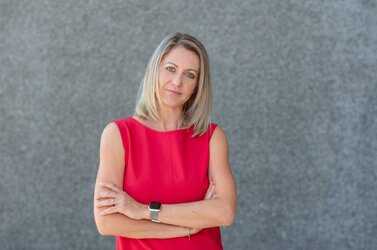
The Deggendorf Institute of Technology (DIT) has succeeded in acquiring funding from the German Research Foundation (DFG) for basic research in black skin cancer. Prof Dr Melanie Kappelmann-Fenzl is researching the molecular basis of black skin cancer. She is particularly interested in deciphering the misdirected activation in tumours, i.e. why a birthmark changes pathologically. In the future, individualised diagnostics and therapy for those affected could be derived from this.
Personalised medicine and highly innovative therapy approaches have been finding their way into the treatment of cancer for years. Intensive, interdisciplinary basic research is necessary for this. It should uncover what happens in the tumor cells and reveal the complex interrelationships in ever greater detail. That is what Melanie Kappelmann-Fenzl is doing with the help of bioinformatic data. Thanks to the German Research Foundation, she will be able to strengthen her team over the next three years and has found a cooperation in the Friedrich-Alexander University of Erlangen-Nuremberg. Kappelmann-Fenzl’s vision is clear: “This basic research, which is now also being funded in Deggendorf, will hopefully create a better understanding and perhaps reveal approaches for individualised diagnostics and therapy, which, among other things, can have a corresponding effect on healthcare in the region as part of the Medical Campus in Lower Bavaria.” With the help of the funding provided by the DFG, academic training at DIT can also be deepened in this direction. A doctoral position in bioinformatics is expected to be available for this purpose at the end of 2022. Melanie Kappelmann-Fenzl has already been working on the training of data analysts as part of the Master’s programme in Life Science Informatics since 2019.
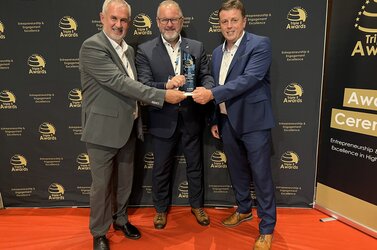
Prof Peter Schmieder was named “Male Entrepreneur Leader of the Year” in Florence on 28 June. For the head of the Bavarian Innovation Transformation Centre (BITZ) Oberschneiding, it is the reward for more than ten years of hard work in the field of business start-ups. Schmieder has thus made history with his Silicon Valley Program in Lower Bavaria and for the Deggendorf Institute of Technology (DIT).
As the best leader for founders and young companies in Europe has Prof Peter Schmieder accepted his winner’s trophy when his name was called last by Prof Dr Thorsten Kliewe, Chairman of the ACEEU (Accreditation Council for Entrepreneurial and Engaged Universities). A top-class, 60-member jury had made the decision. “The competition was strong with renowned competitors from the other countries. Of course, I hoped so, but I still didn’t think that my team and I would actually come out at the top in the end,” Schmieder said, “unbidden” with joy about the Triple-E title. “This is an award for all of us in Oberschneiding and for the Silicon Valley School. It shows that we are on the right track.” The three “E”s of the award, incidentally, stand for Entrepreneurship, Engagement and Education.
The Triple-E Award is intended to draw attention to a necessary transformation at colleges and universities in the European region. “We are very resourceful in Germany when it comes to new technologies. But when things work in the lab, that’s often the end for us. We leave the marketing of such an idea to others and prefer to devote ourselves to new problems again,” Schmieder explains the dilemma at our universities. It’s different at the famous US universities. There, researchers are supposed to go a few steps further. The idea is to become a product, the product is to be scaled to large markets and thus develop benefits for many people. And, of course, profit for those who discovered, developed and brought it to the market. It is precisely this successful, American approach of the DIT Silicon Valley Program that trains professors and is the brand essence of the BITZ in Oberschneiding-
For Schmieder, winning the Triple-E Award is a great achievement: “Our Silicon Valley Program increases the entrepreneurial potential of regional business and management teams. And it does so through a scientifically based, continuous and accompanied process.” And that is precisely what the programme has now been awarded for. For the DIT professor, the matter is clear. He wants the best of both worlds: “German ingenuity and Silicon Valley mindset.”